There
is a term in linguistics which by its very nature is ambiguous and
that is the term neologism. In dictionaries it is generally defined
as * a new word or a new meaning for an established word.!
Everything in this definition is vague. How long should words or
their meanings be regarded as new? Which words of those that
appear as new in the language, say during the life-time of one
generation, can be regarded as established? It is suggestive that the
latest editions of certain dictionaries avoid the use of the
stylistic notation «neologism» apparently because of its
ambiguous character. If a word is fixed in a dictionary and provided
that the dictionary is reliable, it ceases to be a neologism. If a
new meaning is recognized as an element in the semantic structure of
a lexical unit, it ceases to be new. However, if we wish to-divide
the word-stock of a language into chronological periods, we can
conventionally mark off a period which might be called new.
Every
period in the development of a language produces an елог-mous
number of new words or new meanings of established words. Most of
them do not live long. They are not meant to live long. They are, as
it were, coined for use at the moment of speech, and therefore
possess a peculiar property —that of temporariness. The given word
or meaning holds only in the given context and is meant only To
«serve the occasion.»
However,
such is the power of the written language that a word or a meaning
used only to serve the occasion, when once fixed in writing, may
become part and. parcel of the* general vocabulary irrespective of
the quality of the word. That’s why the introduction of new words by
men-of-letters is pregnant with unforeseen consequences: their new
coinages may replace old words and become established in the
language as synonyms and later as substitutes for the old words.
In
this connection it might be noted that such words as субъект,
объект and their derivatives as well as тип, прогресс,
пролетариат and others introduced into the literary
Russian language by V. G. Belinsky have become legitimate4 Russian
words firmly established in the word-stock of the Russian language
and are no longer felt to be alien to the literary language as they
were in4he nineteenth century.
The
coining of new words generally arises first of all with the need to
designate new concepts resulting from the development of science and
also with the need to express nuances of meaning called forth by a
deeper understanding of the nature of the phenomenon in question. It
may also be the result of a search for a more economical, brief and
compact form of utterance which proves to be a more expressive means
of communicating the idea.
The
first type of newly coined words, i. e. those which designate
newborn concepts, may be named terminological coinages. The
secondtype, I. e. words coined because their creators seek expressive
utterance may be named stylisticcoinages.
New
words are mainly coined according to the productive models for
word-building in the given language. But the new words of the
literary-bookish type we are dealing with in this chapter may
sometimes be built with the help of affixes and by other means which
have gone out of use or which are in the process of dying out. In
this case the stylistic effect produced by the means of word-building
chosen becomes more apparent, and the stylistic function of the
device can be felt more acutely.
It
often happens, however, that the sensitive reader finds a new .
application of an already existing word almost revolting. Purists of
all shades rise up in protest against what they call the highly
objectionable and illegitimate usage of the word. But being once
successfully used, it may be repeated by other writers and so may
remain in the language and, moreover, may influence the further
history of the semantic development of the word. V. V.
Vinogradov justly remarks:
«…The
turning point in the semantic history of many words is the new,
vividly expressive, figurative, individual use of them. This new and
genuinely artistic application of a word, if it is in conformity with
the general tendencies of the semantic development of the
language, not infrequently predetermines the further semantic
development of the word.»1
Among
new coinages of a literary-bookish type must be mentioned a
considerable layer of words appearing in the publicistic style,
mainly in newspaper articles and magazines and also in the newspaper
style— mostly in newspaper headlines. To these belongs the word
Blimp — a name coined by Low, the well-known English cartoonist.
The name was coined to designate an English colonel famous for his
conceit, brutality, ‘ultra-conservatism. This word gave birth to a
derivative, viz. Blimpish. Other examples are ‘backlash’ (in
‘backlash policy’) and its opposite ‘frontlash’.
Literary
critics, men-of-letters and linguists, have manifested different
attitudes towards new coinages both literary and colloquial. Ever
since the 16th century, literature has shown example after example of
the losing battle of the purists whose strongest objection to the new
words was on the score of their obscurity. A. A. Baugh points out
that the great exponent of this view was Thomas Wilson. His «Arteof
Rhetor -ique» (1533) was several times reprinted and was used by
Shakespeare.
Of
course, there are different degrees of purism. In other words, the
efforts of scholars to preserve the purity of their language should
not always be regarded*as conservative. They do not looJ< upon any
and every change with suspicion or regard an innovation as invariably
a corruption of the language.
Most
of the new words of the 16th century as well as those of the 17th
were foreign borrowings from Latin, Greek and continental French. The
words were introduced into the English language and used in the
same
sense and with almost the same pronunciation as in the language they
were borrowed from. But most of those which have remained in the
language underwent changes due to the process of assimilation and
were finally «naturalized.» This process is slow. It
sometimes takes centuries to make a word borrowed from another
language sound quite English. The tempo of assimilation is
different with different borrowings, depending in particular on the
language the word is borrowed from. Borrowings from the French
language are easily and quickly assimilated due to long-established
tradition. The process of assimilation plays a rather important role
in the stylistic evaluation of a lexical unit. The greater and the
deeper the process of assimilation, the more general and common the
word becomes, the less bookish it sounds, and the greater the
probability of its becoming a member of the neutral layer of
words.
Throughout
the history of the English literary language, scholars have expressed
their opposition to three main lines of innovation in the vocabulary:
firstly, to borrowings which they considered objectionable
because of their irregularity; secondly, to the revival of archaic
words; and thirdly, because the process of creation of new words.was
too rapid for the literary language to assimilate. The opposition to
one or other of these lines of innovation increased in violence at
different stages in the development of the language, and switched
from one to another in accordance with the general laws of
development in the given
period.
,
We shall refer the reader to books on the history of the English
language for a more detailed analysis of the attitude of purists of
different shades to innovations. Our task here is to trace the
literary, bookish character of coinages and to show which of their
features have contributed to their stylistic labels. Some words have
indeed passed from the literary-bookish layer of the vocabulary where
they first appeared, into the stratum of common literary words and
then into the neutral stratum. Others have remained within the
literary-bookish group of words and have never shown any tendency to
move downwards in the scale.
This
fact is apparently due to the linguistic background of the new words
and also to the demand/or a new unit to express nuances of meaning.
In
our times the same tendency to coin new words is to be observed in
England and particularly in the United States of America. The
literary language is literally inundated with all kinds of new words
and a considerable body of protest has arisen against them. It
is enough to look through some of the articles of the New York Times
on the subject to see what direction the protest against innovations
takes.
Like
earlier periods in the development of the English language, modern
times are characterized by a vigorous protest against the
unrestrained influx of new coinages, whether they have been built in
accordance with the norms of the language, or whether they are of
foreign origin.
«The
danger is not that the reading public would desert good books, but
that abuse of the written language may ruin books.
«As
for words, we are never at a loss; if they do not exist, we invent
them. We carry out purposeful projects in a meaningful manner in
order to achieve insightful experiences.
«We
diarize, we earlirize; any day we may begin to futurize. We also
itinerize, reliablize; and we not only decontaminate and
dehumidifyvbut we debureaucratize and we deinsectize. We are, in
addition, discovering how good and pleasant it is to fellowship with
one another.
«I
can only say, Met us finalize all this nonsense’.»
The
writer of the article then proceeds to give an explanation of the
reasons for such unrestrained coinage. He states that some of the
writers «…are not ashamed of writing badly but rather proud of
writing at all and—with a certain vanity—are attracted by
gorgeous words which give to their slender thoughts an appearance
of power.»
Perhaps
the writer of this article is not far from the truth when he ascribes
literary coinage to the desire to make utterances more pompous and
sensational. It is suggestive that the majority of such coinages are
found in newspaper and magazine articles and, like the articles
themselves, live but a short time. As their effect is
transitory, it must be instantaneous. If a newly-coined word can
serve the demand of the moment, what does it matter to the writer
whether it is a necessary word or not? The freshness of the creation
is its primary and indispensable quality.
The
fate of literary coinages, unlike colloquial ones, mainly depends
on the number of rival synonyms already existing in the vocabulary
of the language. It also depends on the shade of meaning the new
coinage may convey to the mind of the reader. If a new word is
approved of by native speakers and becomes widely used, it ceases to
be a new word and becomes part and parcel of the general vocabulary
in spite of the objections of men-of-letters and other lawgivers of
the language, whoever they may be.
Many
coinages disappear entirely from the language, leaving no mark of
their even brief existence. Other literary neologisms leave traces in
the vocabulary because they are fixed in the literature of their
time. In other words, new literary-bookish coinages will always leave
traces in the language, inasmuch as they appear in writing. This is
not the case with colloquial coinages. These, as we shall see later,
are spontaneous, and due to their linguistic nature, cannot be fixed
unless special care is taken by specialists to preserve them.
Most
of the literary-bookish coinages are built by means of affixation
and word compounding. This is but natural; new words built in this
manner will be immediately perceived because of their unexpectedness.
Unexpectedness in the use of words is the natural device of those
writers who seek to achieve the sensational. It is interesting to
note in passing that conversion, which has become one of the most
productive word-build-
ing
devices of the English language and which is more and more widely
used to form new words in all parts of speech, is less effective in
producing the sensational effect sought by literary coinage than is
the case with other means of word-building. Conversion has become
organic in the .English language.
Semantic
word-building, that is, giving an old word a new meaning, is rarely
employed by writers who coin new words for journalistic purposes.
It is too slow and imperceptible in its growth to produce any kind of
sensational effect.
Conversion,
derivation and change of meaning may be registered as means by which
literary-bookish coinages are formed. These three means of
word-building are mostly used to coin new terms in which new
meanings are imposed on old words. Among coinages of this kind
the word accessories may be mentioned. It has now become an important
word in the vocabulary of feminine fashion. It means gloves, shoes
and handbag, though jewellery and other ornaments are sometimes
included. Mary Reifer’s ‘»Dictionary of New Words» notes a
verb to accessorize meaning 4to provide with dress accessories, such
as handbag, gloves, shoes, etc/. These items are supposed to form a
matching or harmonious whole.
The
new meaning co-exists with the old ones. In other words, new meanings
imposed on old words form one system in which old and new meanings
are ranged in a dictionary according to their rate of frequency or to
some other underlying principle. But there are cases when new
meanings imposed oh old words drive out old meanings. In this
case we register a gradual change in the meaning of the word
which may not incorporate the old one. In most cases, however,
the old meaning is hardly felt; it is generally forgotten and can
only be re-established by etymological analysis.
Thus
the word admire,, which, as in Latin, first meant ‘to feel or express
surprise or astonishment’, has today lost its primary meaning and now
has acquired a new one which, however, still contains a shade of the
old, uiz/’td regard with wonder and approval, esteem or affection, to
delight in’.
The
process of elimination of the old meaning, as is seen from this
example, is slow and smooth. Hardly ever can we register a sudden
switch from one meaning to another: there is always a gradual
transition, and not infrequently J;he two competing meanings
co-exist, manifesting in this co-existence ^an almost imperceptible
internal struggle which ends in the complete elimination of one of
them.
Almost
half of the words in’ihe 18th century «English Dictionary»
compiled by Samuel Johnson may serve as examples of change of
meaning. A word or two taken at random will confirm the
statement just made.
The
word to fascinate meant ‘to bewitch’; ‘to enchant’; ‘to influence
in some wicked and secret manner’. The word available is explained
in Johnson’s Dictionary as «1. Profitable; Advantageous. 2.
Powerful, in force.»
True,
in some respects Johnson’s Dictionary cannot be regarded as a
reliable source of information: his attitude towards colloquial idiom
is
well known. It was not only aversion—it was a manifestation of his
theoretical viewpoint. James Boswell in his «Life of Johnson»
says that the compiler of the dictionary was at all times jealous of
infractions upon the genuine English language, and prompt to repress
what he called colloquial barbarisms; such as pledging myself for
‘undertaking’, line for ‘department’ or Branch’, as the civil line,
the-banking line. He was particularly indignant against the almost
universal use of the word idea in the sense of ‘notion’ or ‘opinion’,
when it is clear that idea, being derived from the Greek word meaning
‘to see’, can t>nly signify something of which an image can be
formed in the mind. We may have, he says, an idea or image of a
mountain, a tree, a building; but we cannot surely have an idea or
image of an argument or proposition.
As
has been pointed out, word-building by means of affixation is still
predominant in coining new words. Examples are: arbiter—’a
spacecraft designed to orbit a celestial body’; lander—’a
spacecraft designed to land on such a body’; missileer—’a person
skilled in missilery or in the launching and control of missiles’;
fruitologist and wreckologist which were used in a letter to the
editor of The times from a person living in Australia. Another
monster of the ink-horn type is the word overdichotomize—’to split
something into too many parts’, which is commented upon in an article
in New York Times Magazine:
«It
is, alas, too much to expect that this fine flower of language,
a veritable hot-house specimen—combining as it does a vogue word
with a vogue suffix—will long survive.»*
The
literary-bookish character of such coinages is quite apparent and
needs no comment. They are always felt to be over-literary because
either the stem or the affix (or both) is not used in the way the
reader expects it to be used. Perhaps it would be more appropriate to
say that by forcibly putting together a familiar stem and a familiar
affix and thus producing an unfamiliar word, the writer compels the
reader to concentrate his attention on the new word, firstly by its
novelty and secondly by the necessity of analysing it in order
to .decipher the message. By using a neologism instead of the word or
combination of words expected, he violates the main property of
a communication, which is to convey the idea straightforwardly and
promptly.
Among
new creations those with the suffix -ize seem to be the most
i;frequent. The suffix -ize gives a strong shade of bookishness to
new fwords. Here are some more examples of neologisms with this
suffix:
‘detribal/3Јd
(Africans)’; ‘accessor/^’; »moisturize’; ‘villagize’.
Thomas
Pyles writes:
«The*-ize
suffix… is very voguish in advertizing copy, a most potent
disseminator of modish expressions; …its fashionableness may
explain why ‘hospitalize’, current since the turn of the century, has
recently begun to flourish.»
Some
affixes are themselves literary in character and naturally carry this
property to derivatives formed with them. Thus, for example, the
prefix anti- has given us a number of new words which are gradually
becoming recognizable as facts of the English vocabulary, e. g.
‘ялй-novelist’,
‘on/i-hero’, ‘шг/t-world’, ‘шгЯ-emotion’, ‘anti-trend’ and the
like.
The
prefix anti-, as is seen from these examples, has developed a new
meaning. It is rather difficult to specify. In the most general terms
it may be defined as ‘the reverse of. In this connection it will be
interesting to quote the words of an English journalist and
essayist.
«The
spirit of opposition is as necessary as the presence of rules and
disciplines, but unlimited kicking over traces can become a tedious
exercise. So can this popular business of being ‘anti’ in general. In
the world of letters the critical lingo of our time speaks of the *
anti-novel’ or * anti-play’ which has an ‘anti-hero’. Since there is
a fashion for characters unable to communicate, people with nothing
to say and no vocabulary with which to explain their vacuity,
‘anti-writing’ may fairly be described as possessing
‘anti-dialogue’.»
The
suffix -dom has also developed a new meaning, as in ‘gangdom’,
‘freckledom’, ‘musicdo/n’ where the suffix is used with the most
general meaning of collectivity. The suffix -ее has been given new
life. We have’ interrogate’, ‘autobiography’ («…the
pseudo-autobiographer has swallowed the autobiographee whole.»
New Statesman, Nov. 29,1963); ‘enrolls’ («Each enrollee is given
a booklet filled with advice and suggestions, and attends the
lecture…» New York Times Magazine, Jan. 26, 1964); ‘omittee’,
‘askee’ («That’s a bad habit, asking a question and not waiting
for an answer, but it’s not always bad for the askee.» — Rex
Stout, «Too many clients») — ^ .; —
The
suffix -ship has also developed a new shade of meaning which is now
gaining literary recognition, as in the coinages:
‘showmans/up’,
‘brinkmans/up’, ‘lifemans/u’p’, ‘lipmans/u’pV ‘mistress mans/up’,
‘sugermans/i/p’, ‘ one-up mans/up’, etc.
In
these coinages» ад interesting phenomenon seems to be taking
place. The word man is gradually growing first into a half-suffix and
finally into part of the complex-suffix -manship with the approximate
meaning ‘the ability to do something better than another person’.
Among
voguish suffixes which colour new coinages with a shade of
bookishness is the suffix -ese, the dictionary definition of which is
«1) belonging to a city or country as inhabitant (inhabitants)
or language, e. g. Genoese, Chinese; 2) pertaining to a
particular writer (of style or diction), e. g. Johnsonese,
journalese.»
Modern
examples are:
‘Daily-Telegraphese’,
‘New Yorkese’; recently a new word has appeared— ‘TV-ese’. It is
the novelty of these creations that attracts our attention
and
it is the unexpectedness of the combination that makes us feel that
the new coinage is of a bookish character.
The
resistance of purists to the unrestrained flow of new coinages of a
bookish character, which greatly outnumbers the natural colloquial
creations, can be illustrated in the following words of Robert E.
Morseberger:
«Anyone
familiar with the current crop of horror movies knows that weird
mutations caused by atomic radiation have spawned a brood of
malignant monsters, from giant insects (half human and otherwise) to
blobs of glup. While these fortunately are confined to science
fiction, our language itself demonstrates similar grotesque mutations
in truncated, telescoped words and words with extra inflationary
growths on the suffix end, not counting the jargon of special groups
from beatniks to sociologists.
«Among
the more frequent and absurd of these linguistic monsters are
condensed words ending in -ratna and -thon. The former comes from
panorama from the Greek pan (== all) plus horama (= a view) or
cyclorama from the Greek kyklos (= а circle) plus horama again. So
far so good; the next development is cinerama, still sound, from the
Greek kinema (= motion) and our old friend horama.
«Now
the advertisers have taken the suffix-root and proceed to torture it
out of sense and recognition, with horama (or rather a vowel followed
by -rama) no longer meaning simply a view but an entire spectacle or
simply a superlative, so that the suffix has devoured all the
original panorama in such distortions as cleanorama (= a spectacular
cleaning spree); tomatorama, beana-rama, bananarama (= a sensational
sale of tomatoes, beans or bananas)…
«Keeping
pace with -rama (pacerama) is -thon, a suffix newly minted from
ancient metal. Pheidippides’ race from the battlefield of
Marathon and the later foot race of that name gave the noun Marathon
the meaning of an endurance contest; but we now have to endure -thon
alone, divorced, and made into a self-sustaining suffix in (sobl)
such words as telethon, walkathon, talkathon, danceathon, cleanathon,
… Clearly -thon and -rama compete in the rivalry between cleanathon
and cleanorama’, both bastard suffixes have swallowed their original
noun, and it is only logical that they should next swallow each other
in * thonorama’ (= an endurance of various -ramas) or ramathon (= a
panoramic or sensational endurance contest).1
The
reader will undoubtedly not fail to observe that the protest against
these «ink-horn» terms is not based on any sound linguistic
foundation. It merely shows the attitude of the writer towards
certain novelties in language. They seem to him monstrous. But there
is no indication as to what makes them monstrous. The writer himself
readily uses new words such asglup, beatniks without quotation marks,
which shows, evidently, that he is reconciled to them. Strugglesome,
informatative, connotate, unworthwhile, inferiorism, deride, to be
accusated are other words which he apparently considers distortions.
The last string of literary coinages is supplied with the following
footnote: «All words used in this sentence are gratefully
acknowledged as coming from college freshman themes.»
Unfortunately
there are no objective criteria for ascertaining the stylistic aspect
of words. Therefore the protest of many language purists is sometimes
based on subjective idiosyncrasy. We find objections to the ways and
means of coining new words, as in the quotation above, and also to
the unrestrained injection into some words of emotive meaning when
this meaning, it is said, has not yet been widely recognized, as top
(— excellent, wonderful), fey (= somewhat whimsical, in touch with
the supernatural, a little cracked).1 This second objection applies
particularly to the colloquial stratum of words. We also find
objections to the new logical meanings forced upon words, as is done
by a certain J. Bell in an article on advertizing agencies.
«Highly
literate men are busy selling cancer and alcoholism to the public,
commending inferior goods, garbling facts, confusing figures,
exploiting emotions…»
Here
the word sell is used in the sense of * establishing confidence in
something, of speaking convincingly, of persuading the public to do,
or buy and use something’ (in this case cigarettes, wine and
spirits); the word commend has developed the meaning of ‘recommend’
and the word inferior has come to mean * lower in price, cheap’; to
garble, the primary meaning of which is ‘to sort by sifting’, now
also means ‘to distort in order to mislead’; to confuse is generally
used in the sense of ‘to mix up in mind’, to exploit emotions means
‘making use of people’s emotions for the sake of gain’.
All
these words have acquired new meanings because they are used in
combinations not yet registered in the language-as-a-system. It is a
well-known fact that any word, if placed in a strange environment,
will inevitably acquire a new shade of meaning. Not to see this,
means not to correctly evaluate the inner laws of the semantic
development of lexical units.
There
is still another means of word-building in modern English which may
be considered voguish at the present time, and that is the blending
of two words into one by curtailing the end of the first component
or the beginning of the second. Examples are numerous: musico-medy
(music+comedy); cinemactress (cinema+actress); avigation
(avia-tion+navigation); and the already recognized blends like smog-
(smoke+ fog); chortle (chuckle+snort); galumph (triumph+gallop) (both
occur in Humpty Dumpty’s poem in Lewis Carroll’s «Through the
Looking Glass»). Arockoon (focket+balloon) is ‘a rocket designed
to be launched from a balloon’. Such words are called blends
In
reviewing the ways and means of coining new words, we must not
overlook one which plays a conspicuous role in changing the meaning
of words and mostly concerns stylistics. We mean injecting into
well-known, commonly-used words with clear-cut concrete meanings, a
meaning that the word did not have before. This is generally due to
the combinative power of the word. This aspect of words has long been
underestimated by linguists. Pairing words which hitherto have
not been paired, makes the components of the word-combinations
acquire a new, and sometimes quite unexpected, meaning. Particularly
productive is the adjective. It tends to acquire an emotive meaning
alongside its logical meaning, as, for instance, terrible, awful,
dramatic, top.
The
result is that an adjective of this kind becomes an intensifies it
merely indicates the degree of the positive or negative quality of
the concept embodied in the word that follows. When it becomes
generally accepted,.it becomes part of the semantic structure of the
word, and in this way the semantic wealth of the vocabulary
increases. True, this process is mostly found in the domain of
conversation. In conversation an unexpectedly free use of words is
constantly made. It is in conversation that such words as stunning,
grand, colossal, wonderful, exciting and the like have acquired this
intensifying derivative meaning which we call emotive.x But the
literary-bookish language, in quest of new means of impressing the
reader, also resorts to this means of word coinage. It is mostly the
product of newspaper language, where the necessity, nay, the urge, to
discover new means of impressing the reader is greatest.
In
this connection it is interesting to quote articles from English and
American periodicals in which problems of language in its functional
aspect are occasionally discussed. In one of them, «Current
Cliches and Solecisms» by Edmund Wilson,2 the improper
application of the primary and accepted meanings of the words
massive, crucial, transpire and others is condemned. The author of
the article is unwilling to acknowledge the objective development of
the word-stock and instead of fixing the new meanings that are
gaining ground in the semantic structure of these words, he tries to
block them from literary usage while ..neglecting the fact that these
new meanings have already been established in the language. This
is what he says:
«Massive!
I have also written before of this stupid and oppressive word, which
seems to have become since then even more common as a ready cliche
that acts as a blackout on thinking. One now meets it in every
department: literary, political, scientific. In a period of moral
impotence, so many things are thought as intimidating that they are
euphemistically referred to as massive. I shall not present further
examples except to register a feeling of horror at finding this
adjective resorted to three times, and twice in the same paragraph,
by Lionel! Trilling in Commentary, in the course of an otherwise
admirable discussion of the Leavis—Snow controversy: massive
signi
fwance
of «The Two Cultures», massive intention of «The Two
Cultures», quite massive blunder of Snow in regard to the
Victorian writers. Was Snow’s essay really that huge and
weighty? If it was, perhaps it might follow that any blunder in it
must also be massive.»
Another
of these emotional intensifiers is the word crucial. It also raises
objections on the part of purists and among them the one whose
article we are quoting. «This word,» writes Edmund Wilson,
«which means properly decisive, critical, has come to be used,
and used constantly, in writing as well as in conversation as if it
meant merely important… ‘But what is crucial, of course, is that
these books aren’t very good…*.’Of course it is of crucial
importance’.»
Another
type of neologism is the nonce-word, i.e. a word coined to suit one
particular occasion. Nonce-words remain on the outskirts of the
literary language and not infrequently remind us of the writers who
coined them. They are created to designate some insignificant
subjective idea or evaluation of a thing or phenomenon and generally
become moribund. They rarely pass into the language as legitimate
units of the vocabulary, but they remain in the language as constant
manifestations of its innate power of word-building.
Here
are some of these neologisms which, by the way, have the right to be
called so because they will always remain neologisms, i. e. will
never lose their novelty:
«Let
me say in the beginning that even if I wanted to avoid Texas I could
not, for I am wived in Texas, and mother-in-lawed, and uncled, and
aunted, and cousined within an inch of my life.»
(J.
Steinbeck)
The
past participles mother-in-lawed, uncled, aunted and cousined are
coined for the occasion on the analogy of wived and can hardly be
expected to be registered by English dictionaries as ordinary
English words.
Here
are some more examples of nonce-words, which strike us by their
novelty, force and aesthetic aspect.
«There
is something profoundly horrifying in this immense, indefinite
not-thereness of the Mexican scene.» (Huxley)
«You’re
the bestest good one—she said—the most bestest good one in the
worldT:»v(H. Ё.* Bates)
«That
was masterly. Or should one say mistressly» (Huxley)
«Surface
knowingness» (J-. Updike); «sevenish» (around seven
o’clock); «morish» (a little more) (A. Christie).
In
modern English new words are also coined by a means which is very
productive in technical literature and therefore is mostly found in
scientific style, viz. by contractions and abbreviations. But
this means is sometimes resorted to for stylistic purposes. Here are
some of these coinages which appear daily in different spheres
of human activity.
TRUD
(=time remaining until dive). The first letters of this word sequence
forms the neologism TRUD which will presumably remain as
a
professional term unknown to wider circles of native English
speakers. Such also are the words LOX (= 1. liquid oxygen explosive,
2. liquid oxygen) and GOX (= gaseous oxygen). To the layman, oxygen
is a gas, but in missilery (also anew word) it is more often a liquid
or even a solid, so gaseous oxygen has to be distinguished. Other
better-known examples are laser (= light amplification by stimulated
emission of radiation);
.
Unesco (United Nations Education and Science Organization); jeep
(GP=General Purpose car).
Not
all of the means of word coinage existing in the English language
have been dealt with in this short survey. The reason for this is
simple: in stylistics there are ways and means of producing an effect
which attract the attention of the reader not only by the novelty of
a coinage but by a more elaborate language effect. This effect must
be specified to make clear the intentions of the writer. The writer
in this case is seeking something that will adequately convey
his idea to the mind of the reader. The means assume some additional
force: novelty+force.
Therefore
in the survey of the means of word-formation only those have been
selected which provide novelty+force.
The
stylistic effect achieved by newly-coined words generally rests on
the ability of the mind to perceive novelty at the background of the
familiar. The sharper the contrast, the more obvious the effect. The
slight, almost imperceptible changes caused by extensions of an
original meaning might well produce a stylistic effect only when the
reader is well versed in discriminating nuances of meaning.
Thus
the use of the words commitment and commit in the meaning of
‘involvement’ and ‘involve’ has imperceptibly crept into common use
since approximately 1955 and is now freely used. So also are the use
of unfortunately instead of ‘regretfully’, the use of dramatic and
massive as intensifiers. Such changes are apparent only to the eye of
the lexicographer and will hardly provoke a twofold application
of meaning, unless, of course, the context forcibly points to such an
application.
However,
these words will ordinarily carry an expressive function due to their
emotive meaning.
When
we tackle the problem of SDs and penetrate more deeply into its
essence, it becomes apparent that stylistic function is not confined
to
t
phenomena which are foregrounded, as newly-coined words generally
are. A stylistic effect may also be achieved by the skilful interplay
of a long-established meaning and one just being introduced into the
lan-guage-as-a-system.
к
Thus the word deliver in the United States has acquired the
meaning
|л
‘to carry out or fulfil an expectation; make good’ (Barnhart
Dictionary).
|
If this word were to carry its original meaning alongside the one now
I
.current in the U. S. it would produce a stylistic effect, if, of
course, this twofold application of the word is done deliberately.
Novelty is not a device. One must distinguish between a deliberate,
conscious employment
v
of the inherent property of words to be used in different meanings
simultaneously and the introduction of a new meaning which in
the given context excludes the one from which it is derived.
In
the following examples taken from the Barnhart Dictionary the
italicized
words do not display any twofold meanings, although they are
illustrative of the new meanings these words have acquired.
«…he
has spent hours reading government cables, memoranda and classified
files to brief himself for in-depth discussions.»
*In-depthT,
adj. means ‘going deeply, thoroughly into a subject’.
«Bullit,
I find, is completely typical of the ‘now’ look in American
movies — a swift-moving, constantly shifting surface that suggests
rather than reveals depth.»
The
word now as an adjective is a novelty. Barnhart labels it slang—
«very fashionable or up-to-date; belonging to the Now
Generation.»
And
still the novelty can be used for stylistic purposes provided that
the requirements for an SD indicated earlier are observed. It must be
repeated that newly-minted words are especially striking. They check
the easy flow of verbal sequences and force our mind to take in the
referential meaning. The aesthetic effect in this case will be
equal to zero if the neologism designates a new notion resulting from
scientific and technical investigations. The intellectual will
suppress the emotional. However, coinages which aim at introducing
additional meanings as a result of an aesthetic re-evaluation of the
given concept may perform the function of a stylistic device.
ООО Учебный центр
«ПРОФЕССИОНАЛ»
Статья-реферат
По теме:
«Стилистическая дифференциация лексики»
“Stylistic Differentiation of the Vocabulary”
Исполнитель:
Малютина Ольга Владимировна
Москва 2021 год
Content
1. Introduction. AN OUTLINE OF STYLE
CLASSIFICATIONS
2.
SOCIALLY
REGULATED SUBLANGUAGES
3.
THE COLLOQUIAL
SPHERE
4.
Stylistic
Differentiation of the English Vocabulary
·
The literary
vocabulary
·
The colloquial
vocabulary
·
Neutral words
·
Common standard colloquial
words
·
Special
colloquial vocabulary
5. Conclusion
1.
Introduction
AN
OUTLINE OF STYLE CLASSIFICATIONS
The main aim
of the report is to give a detailed description of linguistic styles and
stylistic differentiation of the vocabulary. As these two aspects are closely
connected it helps learners to distinguish both of them.
Starting a
report on a style differentiation of the vocabulary, it is necessary to
introduce a short outline of style classifications as an essential part of
linguistic sphere connected with lexicology.
First, the
books by I.R. Galperin, both reliable sources of detailed stylistic information.1
Galperin distinguishes five styles in present-day English. They are:
I.
Belles
Lettres
1.
Poetry
2.
Emotive
Prose
3.
The
Drama
II.
Publicistic
Style
1.
Oratory
and Speeches
2.
The
Essay
3.
Articles
III.
Newspapers
1.
Brief
News Items
2.
Headlines
3.
Advertisements
and Announcements
4.
The
Editorial
IV.
Scientific
Prose
V.
Official
Documents
The varieties
enumerated certainly differ from one another, which is shown by the abundance
of illustrations discussed. What prevented him from including a Colloquial
Style was explained above (see Introduction).
There is one
more point that calls for discussion: the validity of postulating a
Belles-Lettres Style. It may in fact be assumed that Galperin’s position is not shared by most of
those interested in style matters. The diversity of what is actually met with
in books of fiction turns the notion of a belles-lettres style into something
very vague. In modern realistic prose the reader also comes across emotionally
coloured passages of text that tend to use image-creating devices — tropes and
figures of speech. Such passages are, as a general rule, the author’s
narrative, especially expositions, lyrical digressions, philosophical
descriptions of landscape or the mental state of a character. We can encounter
practically every speech type imaginable in books of fiction, whose authors’
guiding principle is being true to life.
Next comes the well-known
work by I.V. Arnold Stylistics of Modern English (two editions: 1973 and,
thoroughly revised, 1981).5 LV. Arnold singles out four styles:
1. Poetic style
2. Scientific style
3. Newspaper style
4. Colloquial style
What speaks in favour of
LV. Arnold’s concept is that she recognises a colloquial style. Singling out a
poetic and a scientific style seems valid. Arnold overlooks a very important style-forming sphere: that
of official intercourse — business correspondence, legal documents, municipal
announcements and the like.
Very rich in information,
with a number of new problems raised and solved, is the handbook by A.N.
Morokhovsky “Stylistics of the English Language”, published in Kiev. The problem
of styles is to be settled ends with the following set of style classes:
1. Official business
style
2. Scientific-professional
style
3. Publicistic style
4. Literary colloquial
style
5. Familiar colloquial
style
A.N. Morokhovsky warns
the reader that the five classes of what he calls ‘speech activity’ are
abstractions, rather than realities, and can only seldom be observed in their
pure forms: mixing styles is the prevailing practice.
Summing up, we shall have
to state that logical infallibility is combined here with insufficient
informative force: it is the general principle that Dolinin intends to
demonstrate (entirely succeeding); only a few concrete speech types and styles
are mentioned. Dolinin’s main concern is to show the validity and applicability
of the scheme; as for attempting to calculate what is incalculable by its very
nature, K. A. Dolinin is too sagacious a scholar to engage in hopeless affairs.
We shall review, finally,
one more well-known book: M.N. Kozhina’s Stylistics of the Russian Language22
raises a considerable number of problems, to discuss which would take up too
much space. M.N. Kozhina
lists type-forming and socially significant spheres of communication as
follows: 1) official; 2) scientific; 3) artistic; 4) publicistic; 5) of daily
intercourse (= colloquial).
From the discussion of
classifications reviewed above, we should draw certain conclusions. No
classification whatever can be exhaustive, universally applicable, and
reflecting the innumerable relationships between common features and
distinctions of all text types. The smaller the classes after segmenting the
whole, the less practicable and logically reliable the result is bound to be.
On the contrary, the division into smaller numbers diminishes the explanatory
force of the procedure, but secures more definite results.
2. SOCIALLY
REGULATED SUBLANGUAGES
The use of the
sublanguage fettered by formality is as wide as any other, since it is up to us
what we regard as formal. There certainly are degrees of formality. Both the
Charter of the United Nations (1945) and a business letter signed by a
low-ranking official are formal, i.e. as the meaning of the adjective formal
necessarily implies devoid of any indication of private emotions (except when
the subject is directly connected with emotions — say, in congratulations and
condolences) and — what is perhaps of greater importance, or at least, quite
indispensable — devoid of any trace of familiarity.
A very rough and
approximate gradation of sub-spheres and their respective sublanguages follows:
a) private correspondence
with a stranger;
,b) business,
correspondence between representatives of commercial or other establishments;
c) diplomatic
correspondence, international treaties, other documents;
d) legal documents (civil
law — testaments, settlements, etc.; criminal law — verdicts, sentences, etc.);
e) personal documents
(certificates, diplomas, etc.).
This is the sphere of written lingual
intercourse, although texts of some of the types are read aloud in public.
Common to the genres enumerated is:
1. ‘Superneutral’ features of
this whole group of sublanguages.
2. Socially established (as
opposed to free creative) character, which, as alluded to before, may be
collectively referred to as archaic, i.e. either obsolete or obsolescent.
3. Predetermined lingual form
(in all the genres mentioned, though the degree is, of necessity, different).
4. Cliches (different genres
have stereotyped expressions of their own).
5. Long (polysyllabic) words of
Latin or Greek origin, often euphemistic as compared with their counterparts.
6. Periphrastic expressions
where a single word might have done just as well.
7. Complex syntax as compared to
that of commonly bookish texts.
8. Established forms of
composition that cannot be deviated from; they naturally differ in each genre
discussed below.
3. THE COLLOQUIAL SPHERE
The term colloquial is widely used by
stylists (although I.R. Galperin, as we remember, rejected outright both the
term and the notion for having in his opinion, nothing in common with what he
understood by stylistics).
By colloquial we mean what is only
slightly lower than neutral — such forms of speech in fact as are used by
people when they do not mean to be rude, sarcastic or witty, when they do not
think of how they should express themselves, only of what they intend to say.
To put it another way: our speech usually becomes colloquial (i.e. with a tinge
of familiarity, relaxed without being offensive) when we feel at ease, when we
do not keep in our minds our social obligations and conventions. Talking with
our friends, we do not even notice the forms of the sublanguage we employ, but
as soon as a stranger appears, especially our superior, a person we esteem, we
usually drop our slack and lazy manner of speaking, we avoid colloquial forms,
switching over to another «wavelength», and use preferably neutral
and super neutral (literary) forms. The colloquial stratum is followed by a
lower one comprising jargon, slang, and nonce creations.
It must be borne in mind that the
term ‘colloquial speech’ is applied by researchers to careless, unconventional,
free-and-easy everyday speech of only those who are well educated and can speak
‘correct’ literary English perfectly well, whenever it is necessary. Just as in
this country, uneducated or semi-educated speakers understand the literary
language, but cannot actively use it themselves, making inadmissible mistakes,
mostly in pronunciation, often
in grammar and in choice of words. Hence, what they use is not colloquial
English, but just incorrect English.
The principal and practically the
only absolutely relevant feature of the colloquial sphere of speech is absence of
any definite stylistic purpose as a result of the informality of the
communicative situation.
Just as in the case of vocabulary
(see Chapter on Lexicology of Units), where every non-neutral manifestation was
to be regarded as either ‘better’ (‘higher’) than neutral, or ‘worse’ (‘lower’)
than neutral, the primary division of the bulk of specific features (not only
with reference to the colloquial sublanguage, but here it manifests itself in a
most visual way!) is into ‘overstatement’ and ‘understatement’, ‘redundance’
and ‘lack’, ‘saying too much’ or ‘saying too little’ as compared to what should
be done in the neutral sphere. The two tendencies, opposite but dialectically
interwoven, are what is called below ‘Explication’ and ‘Implication’.
4. Stylistic Differentiation of the
English Vocabulary
The word-stock of any language may be
presented as a system, the elements of which are interconnected, interrelated
and yet independent. Then the word-stock of the English language may be divided
into three main layers (strata): the literary layer (stratum), the neutral
layer, and the colloquial layer. The literary and the colloquial layers contain
a number of subgroups. Each subgroup has a property it shares with all the
subgroups within the layer.
The classification given by
I.R.Galperin reflects to a great extent the mobility of the lexical system so characteristic
of the English language at its present stage of development. The vocabulary has
been divided here into two basic groups: standard and non-standard vocabulary.
The literary vocabulary consists of the following groups of
words:
1.common literary;
2.terms and learned words;
3.poetic words;
4.archaic words;
5.barbarisms and foreign words;
6.literary coinages and nonce-words.
The colloquial vocabulary includes the following groups of
words:
1.common colloquial words;
2.slang;
3.jargonisms;
4.professionalisms;
5.dialectal words;
6.vulgar words;
7.colloquial coinages.
The common literary, neutral and
common colloquial words are grouped under the term Standard English Vocabulary.
Other groups in the literary and colloquial layers are called special literary
(bookish) vocabulary and special (non-standard) colloquial vocabulary.
Neutral words form the bulk of the English
Vocabulary and are used in both literary and colloquial language. Neutral words
are the main source of synonymy and polysemy. Unlike all other groups, neutral
words don’t have a special stylistic colouring and are devoid of emotional
meaning.
Common standard colloquial words
Common colloquial words are always
more emotionally coloured than literary ones. They are used in informal
communication. Both literary and colloquial words have their upper and lower
ranges. The lower range of literary words approaches the neutral layer and has
a tendency to pass into that layer. The upper range of the colloquial layer can
easily pass into the neutral layer too. The lines of demarcation between common
colloquial and neutral and common literary and neutral are blurred. Here we may
see the process of interpenetration of the stylistic layers. The stylistic
function of the different layers of the English Vocabulary depends in many
respects on their interaction when they are opposed to one another. It is
interesting to note that anything written assumes a greater degree of
significance than what is only spoken. If the spoken takes the place of the
written or vice versa, it means that we are faced with a stylistic device.
Specific literary vocabulary
a) Terms. Terms are
generally associated with a definite branch of science and therefore with a
series of other terms belonging to that particular branch of science. They know
no isolation; they always come in clusters, either in a text on the subject to
which they belong, or in special dictionaries which, unlike general
dictionaries, make a careful selection of terms. Terms may appear in scientific
style, newspaper style, publicistic style, the belles-lettres style, etc. Terms
no longer fulfill their basic function, that of bearing an exact reference to a
given notion or concept. Their function is either to indicate the technical
peculiarities of the subject dealt with, or to make some references to the
occupation of a character whose language would naturally contain special words
and expressions.
b) Poetic and highly literary
words. First of all poetic words belong to a definite style of language
and perform in it their direct function. If encountered in another style of
speech, they assume a new function, mainly satirical, for the two notions,
poetry and prose, have been opposed to each other from time immemorial. Poetic
language has special means of communication, i.e. rhythmical arrangement, some
syntactical peculiarities and certain number of special words. The specific
poetic vocabulary has a marked tendency to detach itself from the common
literary word stock and assume a special significance. Poetic words claim to
be, as it were, of higher rank.
c) Archaic words. The
word stock of a language is in an increasing state of change. In every period
in the development of a literary language one can find words which will show
more or less apparent changes in their meaning or usage, from full vigour,
through a moribund state, to death, i.e. complete disappearance of the unit
from the language .We’ll distinguish 3 stages in the aging process of words: 1)
the beginning of the aging process when the word becomes rarely used. Such
words are called obsolescent, i.e. they are in the stage of gradually passing
out of general use; 2) The second group of archaic words are those that have
already gone completely out of use but are still recognized by the English
speaking community. These words are called obsolete. 3) The third group, which
may be called archaic proper, are words which are no longer recognized in
modern English, words that were in use in Old English and which have either
dropped out of the language entirely or have changed in their appearance so
much that they have become unrecognizable.
d) Barbarisms and foreign words.
Barbarisms are words of foreign origin which have not entirely been assimilated
into the English language. They bear the appearance of a borrowing and are felt
as something alien to the native tongue. The great majority of the borrowed
words now form part of the rank and file of the English vocabulary. There are
some words which retain their foreign appearance to greater or lesser degree.
These words, which are called barbarisms, are also considered to be on the outskirts
of the literary language. Most of them have corresponding English synonyms.
Barbarisms are not made conspicuous in the text unless they bear a special load
of stylistic information. Foreign words do not belong to the English
vocabulary. In printed works foreign words and phrases are generally italicized
to indicate their alien nature or their stylistic value. There are foreign
words which fulfill a terminological function.
e) Literary coinages. Every
period in the development of a language produces an enormous number of new
words or new meanings of established words. Most of them do not live long. They
are coined for use at the moment of speech, and therefore possess a peculiar
property – that of temporariness. The given word or meaning holds only in the
given context and is meant only to “serve the occasion”. However, a word or a
meaning once fixed in writing may become part and parcel of the general
vocabulary irrespective of the quality of the word. Neologisms are mainly
coined according to the productive models for word-building in the given
languages. Most of the literary coinages are built by means of affixation and
word compounding.
Special colloquial vocabulary
a) Slang. The term slang is ambiguous and
obscure. The “New Oxford English Dictionary” defines slang as follows:1) the
special vocabulary used by any set of persons of low or disreputable character;
language of a low and vulgar type…; 2) the cant or jargon of a certain class or
period; 3) language of highly colloquial type considered as below the level of
standard educated speech, and consisting either of new words or current words employed
in some special sense. In England and USA slang is regarded as the quintessence
of colloquial speech and therefore stands above all the laws of grammar.
b) Jargonisms. Jargon is a recognized term for a group of words that
exist in almost every language and whose aim is to preserve secrecy within one
or another social group. Jargonisms are generally old words with entirely new meanings
imposed on them. Most of the jargonisms of any language are absolutely
incomprehensible to those outside the social group which has invented them.
They may be defined as a code within a code. Jargonisms are social in
character. In England and in the USA almost any social group of people has its
own jargon. There is a common jargon and special professional jargons.
Jargonisms do not always remain on the outskirts of the literary language. Many
words entered the standard vocabulary.
c) Professionalisms. Professionalisms are the words used
in a definite trade, profession or calling by people connected by common
interests both at work or at home. Professional words name anew already
existing concepts, tools or instruments, and have the typical properties of a
special code. Their main feature is technicality. They are mono semantic. Professionalisms
do not aim at secrecy. They fulfill a socially useful function in
communication, facilitating a quick and adequate grasp of the message.
Professionalisms are used in emotive prose to depict the natural speech of a
character. The skillful use of a professional word will show not only the
vocation of a character, but also his education, breeding, environment and
sometimes even his psychology.
d) Dialectal words. Dialectal words are those which in
the process of integration of the English national language remained beyond its
literary boundaries, and their use is generally confined to a definite
locality. There sometimes is confusion between the terms dialectal, slang and
vernacular. All these groups when used in emotive prose are meant to
characterize the speaker as a person of a certain locality, breeding,
education, etc. Some dialectal words are universally accepted as recognized
units of the standard colloquial English. Of quite a different nature are
dialectal words which are easily recognized as corruptions of standard English words.
Dialectal words are only to be found in the style of emotive prose, very rarely
in other styles. And even here their use is confined to the function of
characterizing personalities through their speech.
e) Vulgar words. The term vulgarism is rather
misleading. Webster’s “New International Dictionary” defines vulgarism as “a vulgar
phrase or expression, or one used only in colloquial, or, esp. in unrefined or
low, speech”. I.R.Galperin defines vulgarisms as expletives or swear-words and
obscene words and expressions. There are different degrees of vulgar words.
Some of them, the obscene ones, are called “four-letter” words. A lesser degree
of vulgarity is presented by expletives and they sometimes appear in
euphemistic spelling. The function of vulgarisms is almost the same as that of interjections
that is to express strong emotions. They are not to be found in any style of
speech except emotive prose, and here only in the direct speech of the characters.
f) Colloquial coinages. Colloquial coinages (nonce-words)
are spontaneous and elusive. Most of them disappear from the language leaving
no trace in it. Some nonce-words and meanings may acquire legitimacy and thus
become facts of the language, while on the other hand they may be classified as
literary or colloquial according to which of the meanings is being dealt with. When
a nonce-word comes into general use and is fixed in dictionaries, it is classified
as a neologism for a very short period of time. This shows the objective
reality of contemporary life. Technical progress is so rapid that it builds new
notions and concepts which in their turn require new words to signify them. Nonce-coinage
appears in all spheres of life.
Conclusion
Every manual on stylistics acquaints
the learners with specific features of various types of speech. Studying the
stylistic differentiation of the vocabulary gives a deep understanding of the
context of the text and lets implement a suitable lexis, orally or in a written
form, according to the given situation. Moreover, it gives us a vision of a
time or epoch that can be introduced in a text or a poetry that appears to be a
connection with deep historical roots.
Используемая литература:
1. «Лексикология английского
языка», Антрушина Г. Б., Афанасьева О. В., Морозова Н. Н., М.: Дрофа, 1999,
288с.
2. «Основы стилистики
английского языка», Ю.М. Скребнев. М.: ООО «Издательство Астрель»: 2003, 221 с
3. «Текст как объект лингвистического
исследования», Гальперин И.Р., М: КомКнига, 2006, 144 с
4. https://ru.scribd.com/doc/46997418/Stylistic-Differentiation-of-the-English-Vocabulary
Подборка по базе: Акпатер жалпы орта бiлiм беретiн мектебi КММ.docx, Қазақстан Республикасының Білім және ғылым министрлігі (1).docx, Игра-викторина по казахскому языку на тему_ «Қазақстан Республик, Қазақстан Республикасының Білім және ғылым министрлігі Ауыстырыл, _Қазақстан Республикасының Рәміздері_ тест.docx, Қазақстан Республикасының конституциялық құқығы -жетекші құқық с, ҚАЗАҚСТАН РЕСПУБЛИКАСЫНЫҢ БІЛІМ ЖӘНЕ ҒЫЛЫМ МИНИСТРЛІГІ555.docx, Игра-викторина по казахскому языку на тему_ «Қазақстан Республик, _аза_стан Республикасыны_ денсаулы_ са_тау министірлігі.docx, Қазақстан Республикасының Конституциясы.docx
e) Literary Coinages (Including Nonce-Words)
Neologism — ‘a new word or a new meaning for an established word.’
Every period in the development of a language produces an enormous number of new words or new meanings of established words. Most of them do not live long. They are not meant to live long. They are coined for use at the moment of speech, and therefore possess a peculiar property —that of temporariness. The given word or meaning holds only in the given context and is meant only to «serve the occasion.»
However, such is the power of the written language that a word or a meaning used only to serve the occasion, when once fixed in writing, may become part and parcel of the general vocabulary.
The coining of new words generally arises first of all with the need to designate new concepts resulting from the development of science and also with the need to express nuances of meaning called forth by a deeper understanding of the nature of the phenomenon in question. It may also be the result of a search for a more economical, brief and compact form of utterance which proves to be a more expressive means of communicating the idea.
The first type of newly coined words, i.e. those which designate newborn concepts, may be named terminological coinages. The second type, i.e. words coined because their creators seek expressive utterance may be named stylistic coinages.
Among new coinages of a literary-bookish type must be mentioned a considerable layer of words appearing in the publicistic style, mainly in newspaper articles and magazines and also in the newspaper style— mostly in newspaper headlines.
Another type of neologism is the nonce-word – a word coined to suit one particular occasion. They rarely pass into the standard language and remind us of the writers who coined them.
3. Special colloquial vocabulary
Colloquial words mark the message as informal, non-official, conversational. Apart from general colloquial words, widely used by all speakers of the language in their everyday communication (e. g. «dad», «kid», «crony», «fan», «to pop», «folks»).
a) Slang
There is hardly any other term that is as ambiguous and obscure as the term slang. Slang seems to mean everything that is below the standard of, usage of present-day English.
Slang [origin unknown] — language peculiar to a particular group: as a: the special and often secret vocabulary used by a class (as thieves, beggars) and usu. felt to be vulgar or inferior: argot; b: the jargon used by or associated with a particular trade, profession, or field of activity; 2: a non-standard vocabulary composed of words and senses characterized primarily by connotations of extreme informality and usu. a currency not limited to a particular region and composed typically of coinages or arbitrarily changed words, clipped or shortened forms, extravagant, forced or facetious figures of speech, or verbal novelties usu. experiencing quick popularity and relatively rapid decline into disuse.
— words or expressions that are very informal and are not considered suitable for more formal situations. Some slang is used only by a particular group of people (Macmillan).
Slang words, used by most speakers in very informal communication, are highly emotive and expressive and as such, lose their originality rather fast and are replaced by newer formations. This tendency to synonymic expansion results in long chains of synonyms of various degrees of expressiveness, denoting one and the same concept. So, the idea of a «pretty girl» is worded by more than one hundred ways in slang.
In only one novel by S. Lewis there are close to a dozen synonyms used by Babbitt, the central character, in reference to a girl: «cookie», «tomato», «Jane», «sugar», «bird», «cutie», etc.
b) Jargonisms
Jargonism is a recognized term for a group of words that exists in almost every language and whose
aim is to preserve secrecy within one or another social group. Jargonisms are generally old words with entirely new meanings imposed on them. Most of the jargonisms of any language, and of the English language too, are absolutely incomprehensible to those outside the social group which has invented them. They may be defined as a code within a code, that is special meanings of words that are imposed on the recognized code—the dictionary meaning of the words.
Thus the word grease means ‘money’; loaf means ‘head’; a tiger hunter is ‘a gambler’; a lexer is ‘a student preparing for a law course’.
Jargonisms are social in character. They are not regional. In Britain and in the US almost any social group of people has its own jargon. The following jargons are well known in the English language: the jargon of thieves and vagabonds, generally known as cant; the jargon of jazz people; the jargon of the army, known as military slang; the jargon of sportsmen, and many others.
Jargonisms, like slang and other groups of the non-literary layer, do not always remain on the outskirts of the literary language. Many words have overcome the resistance of the language lawgivers and purists and entered the standard vocabulary. Thus the words kid, fun, queer, bluff, fib, humbug, formerly slang words or jargonisms, are now considered common colloquial. They may be said to be dejargonized.
c) Professionalisms
Professionalisms are the words used in a definite trade, profession or calling by people connected by common interests both at work and at home. Professionalisms are correlated to terms. Terms, as has already been indicated, are coined to nominate new concepts that appear in the process of, and as a result of, technical progress and the development of science. In distinction from slang, jargonisms and professionalisms cover a narrow semantic field, for example connected with the technical side of some profession.
Professional words name anew already-existing concepts, tools or instruments, and have the typical properties of a special code. The main feature of a professionalism is its technicality. Professionalisms are special words in the non-literary layer of the English vocabulary, whereas terms are a specialized group belonging to the literary layer of words. Professionalisms are not known to simple people.
d) Dialectal words
Dialectal words are those which in the process of integration of the English national language remained beyond its literary boundaries, and their use is generally confined to a definite locality. We exclude here what are called social dialects or even the still looser application of the term as in expressions like poetical dialect or styles as dialects.
Dialectal words are normative and devoid of any stylistic meaning in regional dialects, but used outside of them, carry a strong flavour of the locality where they belong. DW has application limited to a certain group of people or to certain communicative situations.
e) Vulgar words or vulgarisms
Vulgarisms are:
1) expletives and swear words which are of an abusive character, like ‘damn’, ‘bloody’, ‘to hell’, ‘goddam’ and, as some dictionaries state, used now, as general exclamations;
2) obscene words. These are known as four-letter words the use of which is banned in any form of intercourse as being indecent.
The function of expletives is almost the same as that of interjections, that is to express strong emotions, mainly annoyance, anger, vexation and the like. They are not to be found in any functional style of language except emotive prose, and here only in the direct speech of the characters.
f) Colloquial coinages (words and meanings)
Colloquial coinages (nonce-words), unlike those of a literary-bookish character, are spontaneous and elusive. Not all of the colloquial nonce-words are fixed in dictionaries or even in writing and therefore most of them disappear from the language leaving no trace in it.
Unlike literary-bookish coinages, nonce-words of a colloquial nature are not usually built by means of affixes but are based on certain semantic changes in words that are almost imperceptible to the linguistic observer until the word finds its way into print.
Kucharenko V.A. A book of practice in Stylistics pp. 25-28, questions, ex. 1, 2, 4.
Lecture 3 Phonetic Stylistic Devices and Graphical Means.
1. Onomatopoeia
2. Alliteration
3. Rhyme
4. Rhythm
5. Graphical Means
The stylistic approach to the utterance is not confined to its structure and sense. There is another thing to be taken into account which, in a certain type of communication plays an important role. This is the way a word, a phrase or a sentence sounds. The sound of most words taken separately will have little or no aesthetic value.
A word may acquire a desired phonetic effect only in combination with other words. The way a separate word sounds may produce a certain euphonic effect, but this is a matter of individual perception and feeling and therefore subjective. However there exist psychological works on the theory of sound symbolism. They checked the associations, which the tested people have with the definite sounds. Statistics shows that their answers coincide very often.
Verier St Woolman, one of the founders of the theory of sound symbolism claimed that a certain sound when pronounced clearly and strong has special meaning and feeling. For example the sound [d], when repeated often may produce an effect of something evil, negative and wicked.
The sound of a word, or more exactly the way words sound in combination, often contributes something to the general effect of the message, particularly when the sound effect has been deliberately worked out. This can easily be recognized when analyzing alliterative word combinations or the rhymes in certain stanzas or from more elaborate analysis of sound arrangement.
The aesthetiс effect of the text is composed not only with the help of sounds and prosody, but with the help of sounds and prosody together with the meaning. The sound side of the belles-letters work makes a whole with rhythm and meaning and can’t influence the reader separately.
To influence aesthetically the sound part of the text should somehow be highlightened. An author can increase an emotional and aesthetic effect of his work through choosing the words, their arrangement and repetitions. Let’s see what phonetic SDs can secure this function.
1. Onomatopoeia
Onomatopoeia is a combination of speech sounds which aims at imitating sounds produced in nature (wind, sea, thunder, etc. – splash, bubble, rustle, whistle) by things (machines or tools, etc. — buzz) by people (singing, laughter, yawning, roar, giggle) and animals (moo, bleat, croak — frog). Therefore the relation between onomatopoeia and the phenomenon it is supposed to represent is one of metonymy: that is it can be used in transferred meaning – tintinnabulation-the sound of bells
There are two varieties of onomatopoeia: direct and indirect.
Direct onomatopoeia is contained in words that imitate natural sounds, as thud, bowwow, ding-dong, buzz, bang, ‘cuckoo. These words have different degrees of ‘imitative quality. Some of them immediately bring to mind whatever it is that produces the sound. Others require some imagination to decipher it.
e.g. And now there came the chop-chop of wooden hammers.
Indirect onomatopoeia is a combination of sounds the aim of which is to make the sound of the utterance an echo of its sense. It is sometimes called «echo writing». Indirect onomatopoeia demands some mention of what makes the sound, as rustling of curtains in the following line. And the silken, sad, uncertain rustling of each purple curtain. An example is: And the silken, sad, uncertain rustling of each purple curtain» (E. A. Poe), where the repetition of the sound [s] actually produces the sound of the rustling of the curtain.
Indirect onomatopoeia is sometimes effectively used by repeating words which themselves are not onomatopoetic but they contribute to the general impact of the utterance: in the poem Boots by R. Kipling soldiers’ tread is shown —
We’re foot-slog-slog-slog-sloggin’ over Africa –
Foot-foot-foot-foot –sloggin’ over Africa.
(Boots – boots – boots – boots – moovi’ up and down again!)
Onomatopoeia helps to create the vivid portrayal of the situation described, and the phonemic structure of the word is important for the creation of expressive and emotive connotations.
2. Alliteration and assonance
Alliteration is a phonetic stylistic device which aims at imparting a melodic effect to the utterance. The essence of this device lies in the repetition of similar sounds, in particular consonant sounds, in close succession, particularly at the beginning of successive words: » The possessive instinct never stands still (J. Galsworthy) or, «Deep into the darkness peering, long I stood there wondering, fearing, doubting, dreaming dreams no mortals ever dared to dream before» (E. A. Poe). Alliteration is also used to name the repetition of first letters: Apt Alliteration’s artful aid.(Charles Churchill).
Alliteration has a long tradition in English poetry as Germanic and Anglo-Saxon poems were organized with its help. (Beowulf)
Assonance is the repetition of similar stressed vowels within the line or stanza.
“… Tell this soul, with sorrow laden, if within the distant Aiden,
I shall clasp a sainted maiden, whom the angels name Lenore… (E. A. Poe)”
Alliteration, like most phonetic expressive means, does not bear any lexical or other meaning. However it supplies the utterance with a certain nuance of the meaning [d]. That’s why alliteration is regarded as a musical accompaniment of the author’s idea, supporting it with some vague emotional atmosphere which each reader interprets for himself.
Alliteration heightens the general aesthetic effect of the utterance when it has connection with sense. Now it’s used only as a subsidiary device. Its role is an expressive one – alliterated words indicate the most important concepts. It’s often used in emotive prose, newspaper headlines, titles, proverbs and sayings: Sense and Sensibility; Pride and Prejudice; safe and sound; part and parcel etc.
3. Rhyme
Rhyme is the repetition of identical or similar terminal sound combination of words. Rhyming words are generally placed at a regular distance from each other. In verse they are usually placed at the end of the corresponding lines.
Identity and similarity of sound combinations may be relative. Thus,
the first criterion is the identity of sound. Form this point of view we distinguish between full rhymes and incomplete rhymes. The full rhyme presupposes identity of the vowel sound and the following consonant sounds in a stressed syllable (heart – part, flood-blood).
Incomplete rhymes are divided into two main groups: vowel rhymes (ассонансы) and consonant rhymes (консонансы). In
vowel rhymes the vowels of the syllables in corresponding words are identical, but the consonants may be different as in (advice-compromise). In consonant rhymes, on the contrary, consonants are identical and disparity in vowels, as in (wind-land, grey-grow).The second criterion: morphological characteristics. Compound (broken) rhymes — when one word rhymes with a combination of words; or two or even three words rhyme with a corresponding two or three words, as in «better – forget her». The peculiarity of rhymes of this type is that the combination of words is made to sound like one word — this device will inevitably give a colloquial and sometimes a humorous touch to the utterance. Compound rhyme may be set against what is called eye — rhyme, where the letters and not the sounds are identical, as in love — prove, flood — brood, have — grave. It follows that compound rhyme is perceived in reading aloud, eye — rhyme can only be perceived in the written verse.III the way the rhymes are arranged within the stanza: couplets – when the last words of 2 successive lines are rhymed – aa; cross rhymes – перекрёстные — abab; framing or ring rhymes – опоясывающие — abba. IV according to their position: e.g. internal rhyme – the rhyming words are placed not at the ends of the lines but within the line:
“I bring fresh showers for the thirsting flowers.” (Shelley)
The rhyme has 2
functions, which are realized simultaneously: disserving (it breaks the line into 2 distinct parts, making the reader to pause) and consolidating (consolidates the ideas expressed in 2 parts).
4. Rhythm
Rhythm is the alternation of stressed and unstressed syllables, more or less regular. As a SD rhythm is a combination of the ideal metrical scheme and its variations governed by the standard.
It exists in all spheres of human activity and assumes multifarious forms. It stirs up emotions whatever its nature or origin, whether it is musical, mechanical or symmetrical as in architecture.
It’s not only a regular pattern of sounds or movements; it’s also any regular pattern in nature or in life. Rhythm can be perceived only provided that there is some kind of experience in catching regularity of alternating patterns.
Rhythm has a great importance not only for music and poetry, but also for prose. In prose rhythm is closely connected with the metre, i.e. different metrical patterns. The rhythm of prose is based on the succession of images, themes and other big elements of the text; repetition, parallel constructions, chiasmus- перекрестный/ реверсированный повтор, similar syntactical patterns. The unit of measure here is not a syllable but a structure, a word-combination, a sequence of phrases, sentences and supra-phrasal units.
Rhythm intensifies the emotions. It contributes to the general sense, helps to get the flow of thoughts and humour of the author. In poetry it conveys the mood, emotions and feelings, sharpens the thought of the author and his characters. Rhythm adds specific importance to some ideas and feelings, it helps to create reality in text. It has expressive, symbolic and graphic functions. It can imitate movement, behaviour and even setting. It foregrounds some particular words, thoughts, ideas, feelings, and vice versa obscures others, thus adding a per’spective to the text.
Stylistic Classification of the English Vocabulary
In order to get a more or less clear idea of the word
stock of any language, it must be presented as a system the elements of which
are interconnected, interrelated and interdependent.
The word stock of any literary language can be
represented as a definite system in which different aspects of a word may be
singled out as interdependent. Lexicology has greatly contributed to
classification of the English vocabulary. For stylistics, the reference to the
problem of Stylistic classification of the vocabulary is vital.
The whole of the word-stock of the English language
can be roughly divided into 3 main layers:
The
literary and colloquial layers contain a number of subgroups.
Each of them
has a property it shares with all the subgroups within the layer.
This common
property which unites different groups of words within the layer may be called
its aspect.
The aspect of the literary layer is its markedly bookish character that makes it more
or less stable.
The aspect of the colloquial
layer is its lively
spoken character that makes it unstable (fleeting).
The aspect of the neutral
layer is its
universal character. It can be employed in all styles of human activity. This
layer is considered as the most stable of all.
The literary layer consists of the groups of words
accepted as the legitimate members of the English vocabulary. They have no
local or dialectal character. Literary stratum serves to satisfy communicative
demands of official, scientific poetic messages.
The colloquial layer of words as qualified in most
English or American dictionaries is not infrequently limited to a definite
language community or confined to a special locality where it circulates. This
stratum is employed in non-official everyday communication.
Though there is no immediate correlation between the
written and the oral forms of speech on the one hand, and the literary and
colloquial words, on the other, yet, for the most part, the first ones are
mainly observed un the written form, as most literary messages appear in
writing. And vice versa: though there are many examples of colloquialisms in
writing (informal letters, diaries, social-net messages), their usage is
associated with the oral form of communication. Consequently, taking for
analysis printed materials we shall find literary words in authorial speech,
descriptions, considerations, while colloquialisms will be observed in the
types of discourse, simulating (copying) everyday oral communication – i.e.
dialogue (or interior monologue) of a prose work.
The literary vocabulary distinguishes between the
following groups of words:
b)
Terms
and learned words;
e)
Barbarisms
and foreign words
f)
Literary
coinages including nonce-words.
The
colloquial vocabulary falls into the following groups:
f)
Common
colloquial words;
The common literary, neutral and common colloquial
words are grouped under the term – Standard
English vocabulary. Other groups in the literary layer are regarded as special vocabulary (or special literary and
special non-literary vocabulary).
Neutral words forming the bulk of the English
vocabulary are used in both literary and colloquial language. Neutral words are
the main source of synonyms and polysemy. Neutral stock is so prolific of new
meanings and the wealth of this layer is often overlooked. This is due to their
inconspicuous character but their power for generating new stylistic variants
is amazing.
Unlike the other
groups, the neutral group of words can’t be considered as having a special
stylistic colouring, while both literary and colloquial words have a definite
stylistic colouring.
Common literary
words are chiefly used in writing and the so-called “polished” speech. One can
always feel whether the word is literary or not. The reason lies in certain
objective features of the given layer.
The following
row of synonyms illustrates the relations existing between the neutral,
literary and colloquial words in the English vocabulary.
Colloquial Neutral Bookish
Kid
child infant
Daddy
father
parent
Chap
fellow
associate
Get out go
away retire
Go on
continue
proceed
Go ahead begin commence
There is no
doubt that these synonyms are not only stylistic but ideographic as well
because there is a definite though slight semantic difference between them, but
this is almost always the case with synonyms.
There are only a
few absolute synonyms in English just in any other language. The main
distinction between synonyms remains stylistic. But stylistic difference may be
of different kinds: is may lie in the emotional tension connoted in a word, or
in the sphere of application or in the degree of the quality denoted.
Colloquial words
are always more emotionally coloured than literary ones. The neutral stratum of words, as the term itself implies, has no
degree of emotiveness.
Both literary
and colloquial words have their upper and lower ranges. The lower range of the
literary words approaches the neutral layer and has a tendency to pass into
this layer.
The distinctive
lines between the common colloquial and neutral on the one hand, and common
literary and colloquial on the other hand are blurred. It is here that the
process of interpretation of stylistic stratum becomes most apparent.
The neutral
vocabulary may be viewed as the invariant of the Standard English Vocabulary.
The stock of words forming the neutral stratum should be regarded as an abstraction.
The words of this are generally deprived of any associations and refer to the
concept more or less directly.
Synonyms of
neutral words, both colloquial and literary assume a far greater degree of
concreteness. Sometimes an impact of a definite kind on the reader is the aim
lying behind the choice of a colloquial or a literary words rather than neutral
words.
The difference in the stylistic aspect of words may
colour the whole of an utterance. In the following example belonging to the pen
of a famous British writer B. Shaw the difference between the common colloquial
vocabulary is clearly seen.
DORA: Oh, I’ve let it out! But he is the right sort: I can
see that. You won’t let it out downstairs, old man, will you?
JUGGINS: the family can rely on my absolute discretion. (Fanny’s
First Play)
The words in Juggin’s answer are on the borderline
between common literary and neutral X words used by Dora are clearly common
colloquial not bordering neutral.
When classifying some speech/text fragment as literary
or colloquial it does not imply that the words constituting it have a
corresponding stylistic meaning. More than that: words with a pronounc4ed
stylistic connotation are few in any type of discourse. The overwhelming majority of its lexis being neutral. Academician L.V. Shcherba gave a perfect
observation that “a stylistically coloured word is like a drop of paint added to a glass
of pure water band colouring the whole of it”.
Слайд 1STYLISTIC LEXICOLOGY
Stylistic Classification of the English Vocabulary
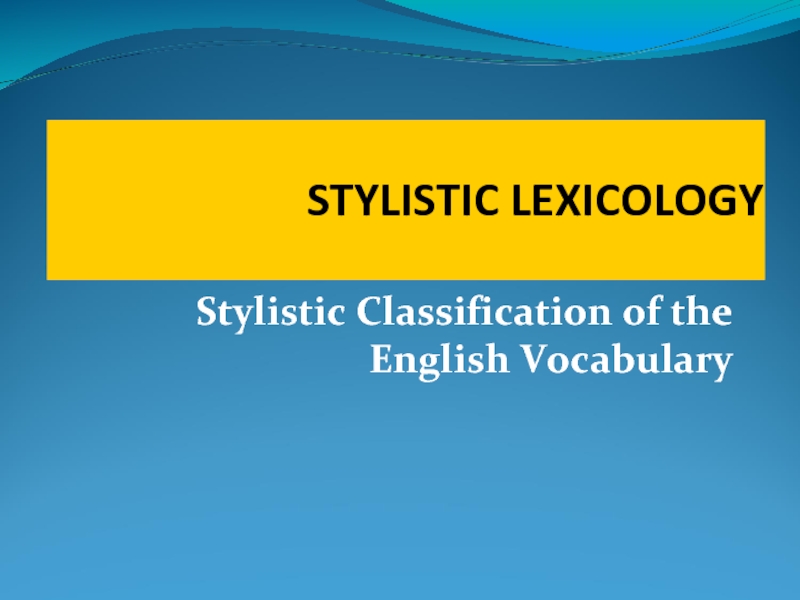
Слайд 2PLAN
Stylistic classification of the English language vocabulary. Classification criteria
Standard English vocabulary
and its constituents. Neutral words.
Specific literary vocabulary. Terms, poetic and archaic words, obsolete and obsolescent words, literary coinages and neologisms, foreignisms and barbarisms
Specific colloquial vocabulary. Professionalisms, jargon and slang, vulgarisms and nonce-words, dialectisms.
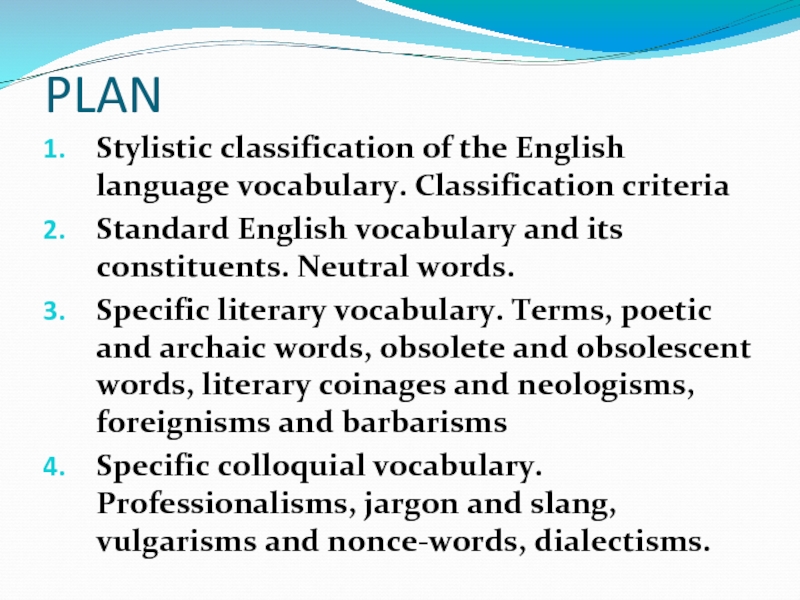
Слайд 4If you can read this, you have a strange too. Can
you read this? Only 55 people out of 100 can.
I couldn’t believe that I could actually understand what I was reading. The phenomenal power of the human mind, according to a research at Cambridge University, it doesn’t matter in what order the letters in a word are, the only imortant thing is that the first and last letter be in the right place. The rest can be a total mess and you can still read it whithout a problem.
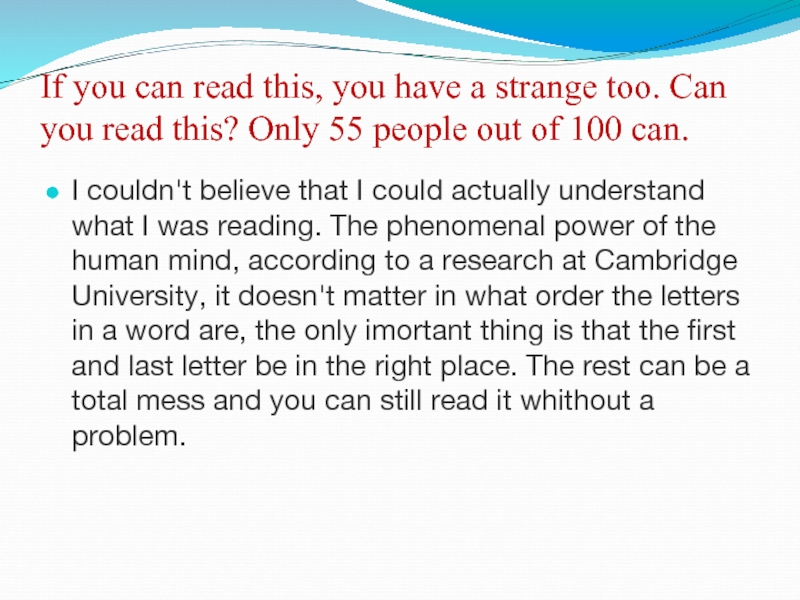
Слайд 5Stylistic classification of the English language vocabulary
The literary layer, the neutral
layer and the colloquial layer
Aspect — a certain property, characteristic of the layer on the whole
Aspect of the literary layer — markedly bookish character, more or less stable
Aspect of the colloquial layer — lively spoken character, unstable, fleeting.
Aspect of the neutral layer — its universal character
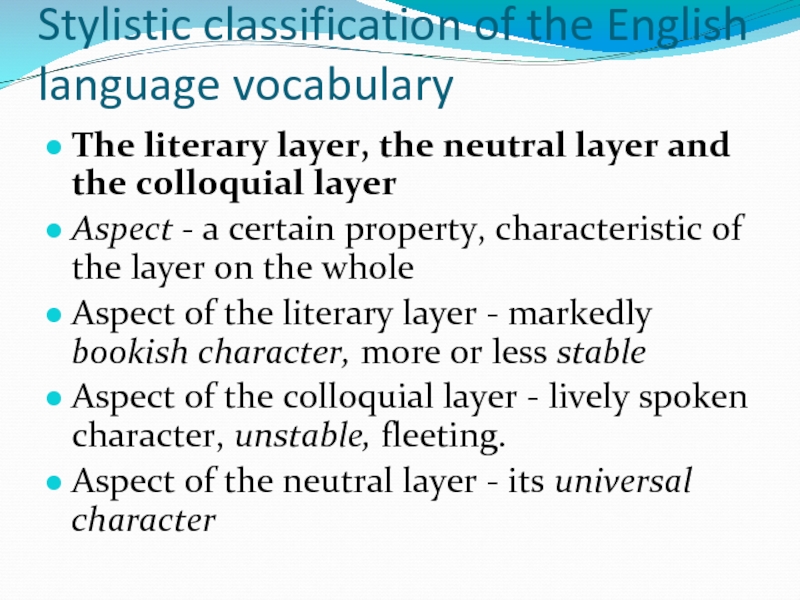
Слайд 6The special literary vocabulary
Terms
Poetical words
Archaic, obsolete/obsolescent words
Foreignisms and barbarisms
Literary nonce-words or
neologisms
Literary words are legitimate members of the English vocabulary, without local or dialectal character. They are used in both oral and written speech
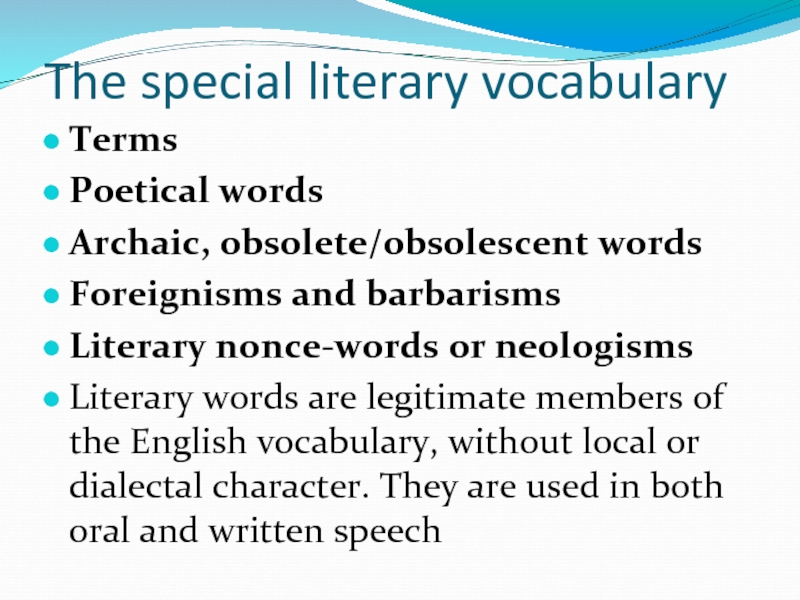
Слайд 7The special literary vocabulary
Bookish words: concord, adversary, divergence, volition, calamity, susceptibility,
sojourn, etc.
Phraseological combinations that belong to the general literary stratum: in accordance with, with regard to, by virtue of, to speak at great length, to draw a lesson, to lend assistance.
in fiction — the primary stylistic function of general literary words which appear in the speech of literary personages is to characterize the person as pompous and verbose
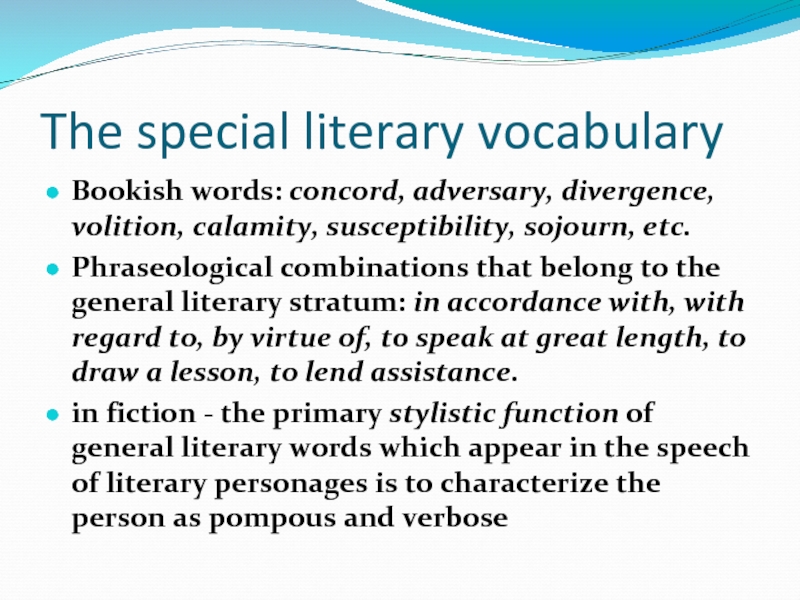
Слайд 8The speech of Mr. Micawber in “David Copperfield”
My dear friend Copperfield”,
said Mr. Micawber,” accidents will occur in the best-regulated families, and in families not regulated by that pervading influence which sanctifies while it enhances the – a – I would say, in short, by the influence of Woman, in the lofty character of Wife, they may be expected with confidence, and must be borne with philosophy”.
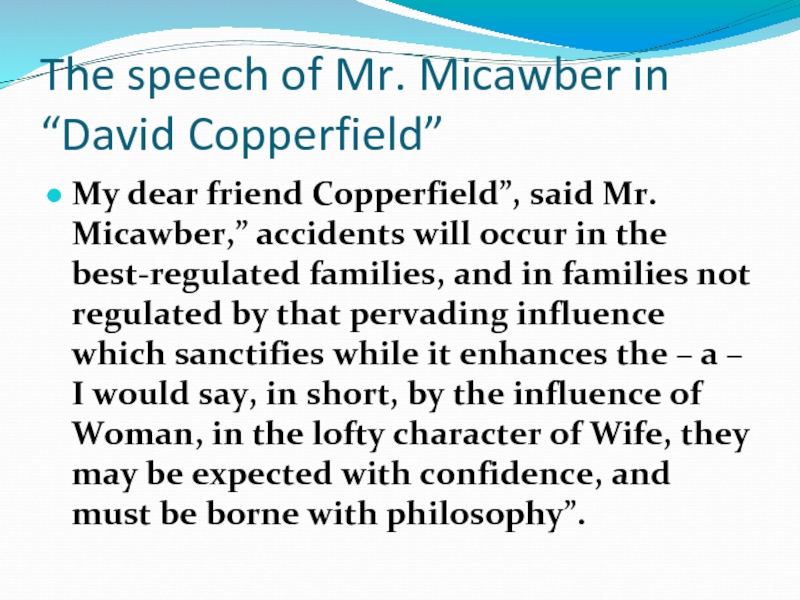
Слайд 9Bookish verbosity is used by the authors of parodies to create
a humorous effect
Snow White.
Once there was a young princess who was not at all unpleasant to look at and had a temperament that may be found to be more pleasant than most other people’s. Her nickname was Snow White, indicating of the discriminatory notions of associating pleasant or attractive qualities with light, and unpleasant or unattractive qualities with darkness. Thus, at an early age Snow White was an unwitting if fortunate target for this type of colorist thinking.”
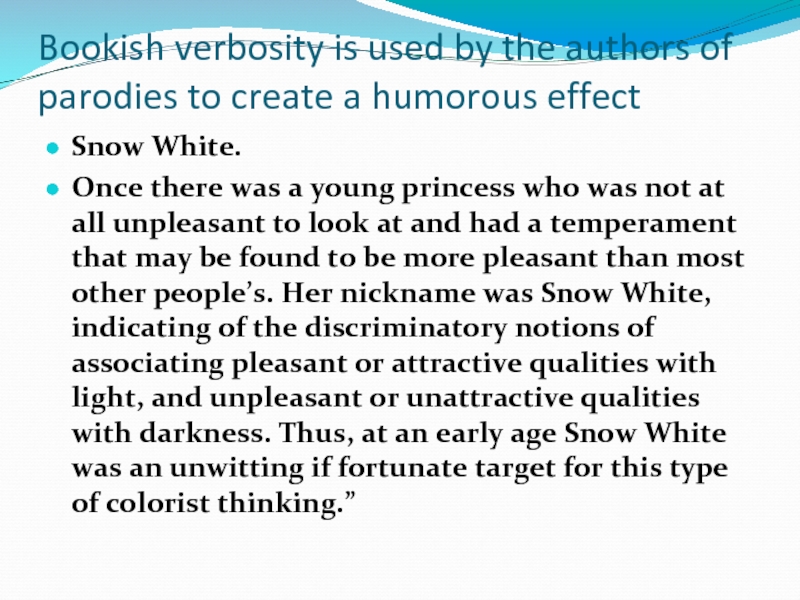
Слайд 10The special Colloquial vocabulary
Professionalisms
slang
jargonisms
dialectisms
neutral words
vulgarisms
colloquial nonce-words
Colloquial layer is often limited to a definite language community or confined to a specific locality where it circulates
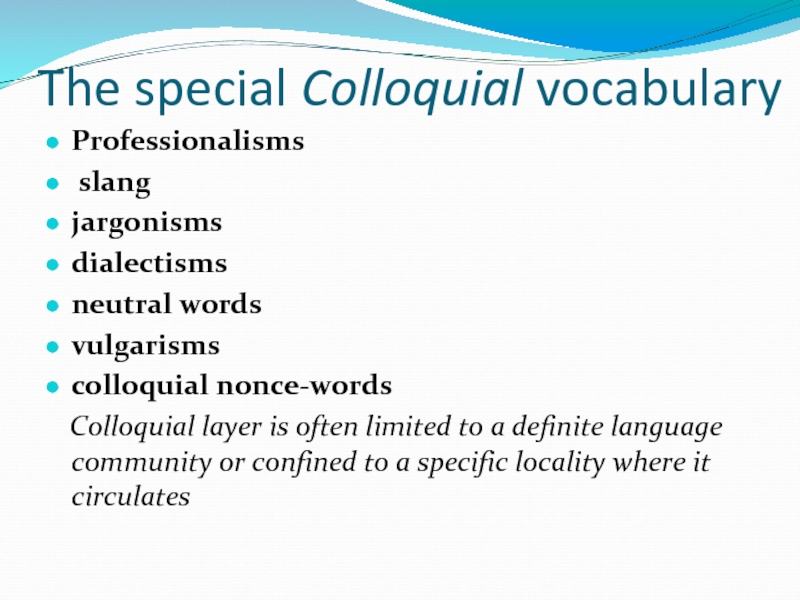
Слайд 11NEUTRAL WORDS
Neutral words form bulk of the English vocabulary, they are
used both in literary and the colloquial language.
They are the main source of synonymy and polysemy
they can be used in any style of speech without causing a special stylistic effect
they are generally devoid of any emotional meaning
They have a monosyllabic character
neutral words have NO SPECIAL STYLISTIC COLORING
They are usually deprived of any concrete associations and refer to the concept more or less directly
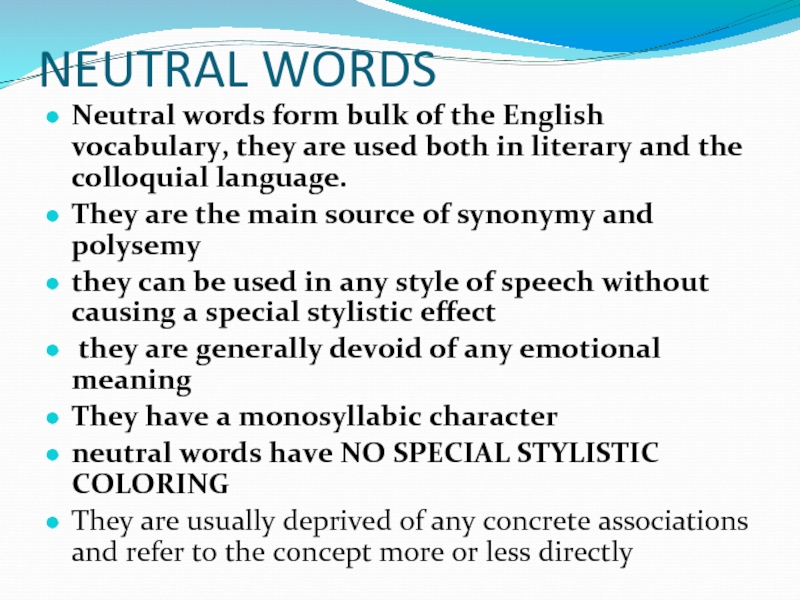
Слайд 12The Common Core
Parts of the body: hand, foot, arm, eye, heart,
chin, bone
Natural landscape: land, field, meadow, hedge, hill, wood, oak
Domestic life: house, home, stool, door, floor, weave, knit
Calendar: sun, moon, day, month, year
Animals: horse, cow, sheep, dog, hen, goat, swine, fish
Common adjectives: black, white, wide, long, good, dark
Common verbs: fly, drink, swim, help, come, see, eat, sit, send, sell, think, love, say, be, go, do, shove, kiss, have, live
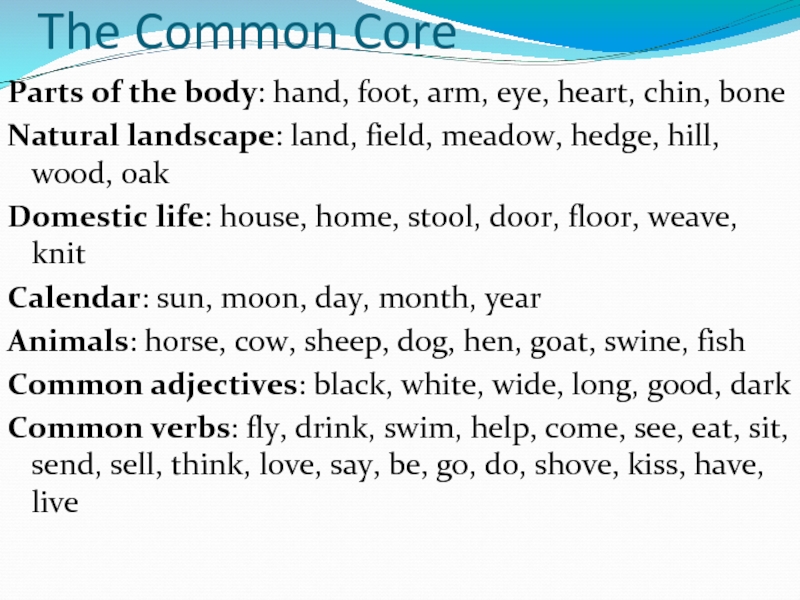
Слайд 13Synonyms are not absolute, there is always a slight semantic difference
in a synonymous pair but the main distinction between synonyms remains stylistic.
And it may be of different types- it may lie in the emotional tension (small-little-tiny) connoted in a word, or in the degree of the quality (fear-terror-awe) denoted, or in the sphere of its application(opponent-rival-foe).
COLLOQUIAL NEUTRAL LITERARY
Kid child infant
Daddy father parent
Chap fellow associate
Go on continue proceed
Teenager boy/girl youth/maiden
Make a move begin commence
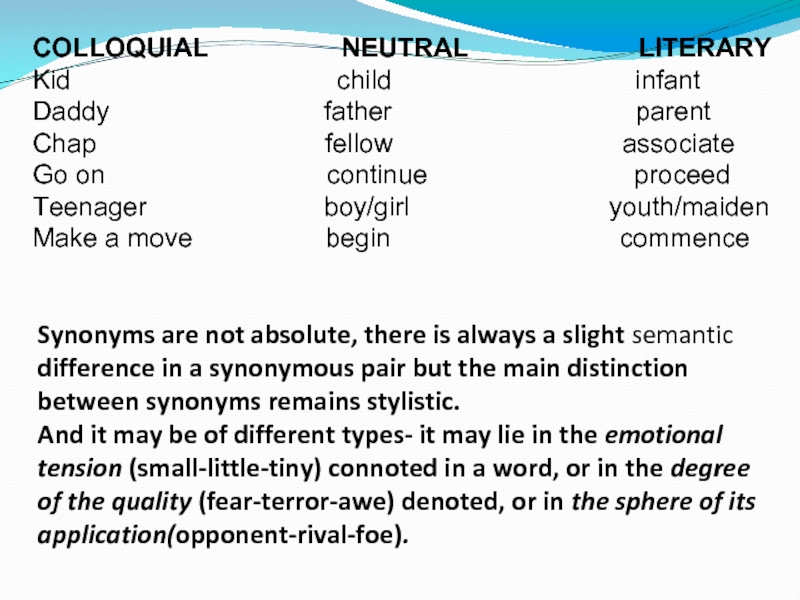
Слайд 14TYPES of SYNONYMS
Synonym (Greek “same” + “name”)
Autumn and fall – dialect
difference
Insane and loony – formal and informal
Salt and sodium chloride – everyday and technical
Rancid (butter,bacon) and rotten (everything else)
Youngster and youth – pleasant and less pleasant
Enough – sufficient; perplexed/bewildered; eventually/at last; dishonest/discreditable
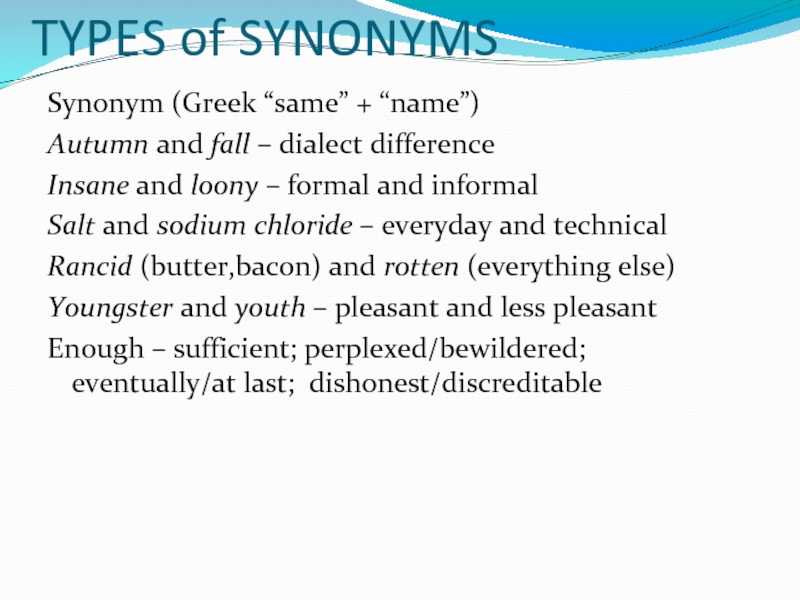
Слайд 15DYNAMICS AND TENDENCIES
Both literary and colloquial words have their upper and
lower ranges.
The lower range of the common literary words approaches the neutral layer and has a tendency to pass into it, while the upper range of the common colloquial layer can easily pass into the neutral layer.
So, the lines between common colloquial and neutral, on the one hand, and common literary and neutral, on the other, are blurred
Colloquial and literary words assume a far greater degree of concreteness, thus causing subjective evaluation, producing a definite impact on the reader or hearer
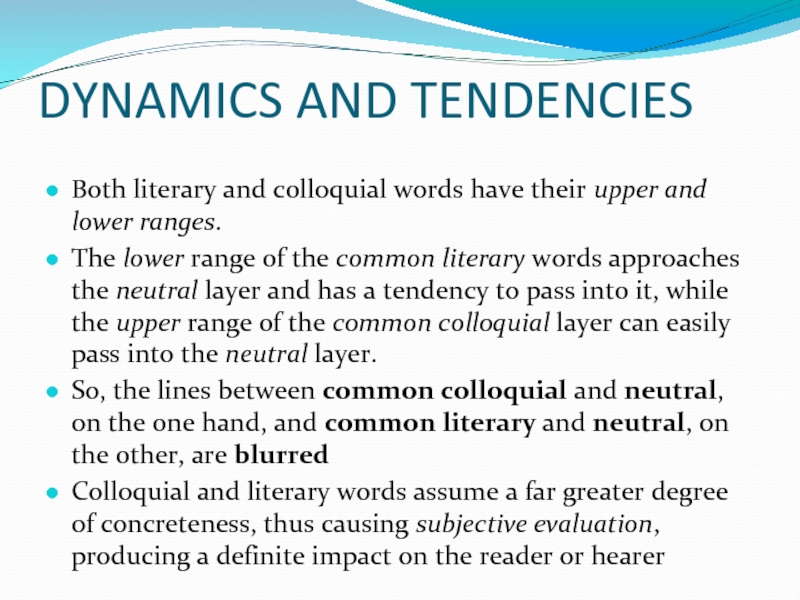
Слайд 16An anecdote once told by Danish linguist O.Esperson
A young lady on
coming home from school was explaining to her grandma: Take an egg, she said, and make a perforation on in the base and a corresponding one in the apex. Then apply the lips to the aperture, and by forcibly inhaling the breath the shell is entirely discharged of its contents”. The old lady exclaimed: ”It beats all how folk do things nowadays. When I was a girl they made a hole in each end and sucked.”
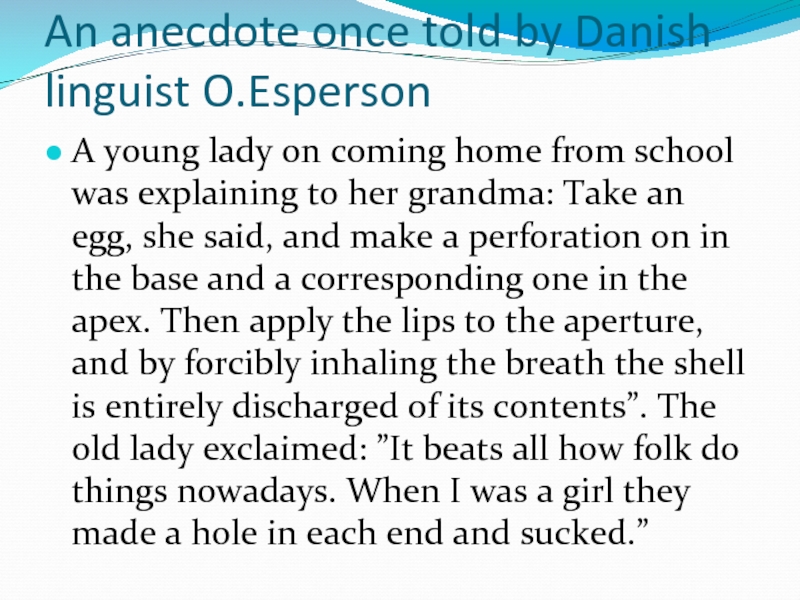
Слайд 17Terms and their groups
A term – is a word (word-combination) denoting
a scientific concept.
Terms formed from Greek, Latin, French, German or other foreign sources, e.g.
Botany, anatomy, schedule, character, chemistry (Greek); locomotive, chivalry, march, parliament, estate (Latin); facade, garage, massage, reportage, banquet, ballet, buffet, fillet, masseur, chef, chassis, masseuse, renaissance, retreat, maneuver, squad, coup d’etat, cliché, belles-lettres, entrepreneur, crochet (French); cobalt, zinc, quartz, sauerkraut, kindergarten (German).
Terms formed from the common word stock, by means of semantic change, e.g. tank, company (milit.); wing (archit); fading, jamming (radio).
Terms formed by means of special suffixes and prefixes: e.g. ultra-violet, antidote, transplant.
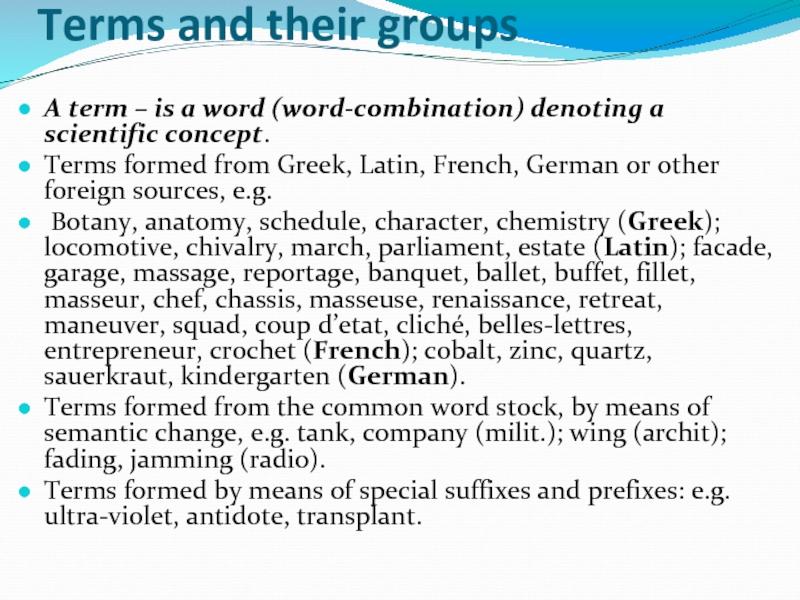
Слайд 19Features of a term
The term has no emotional value. It is
usually monosemantic, at least in the given field of science, technique or art.
The most essential characteristics of a term is its highly conventional quality. It is very easily coined.
The most striking feature of a term is its direct logical relevance to the system of terms used in a particular science, discipline or art.
A term is directly connected with the concept it denotes
Terms belong to the style of scientific language.
They may also appear in other styles: in newspaper style, in publicistic and practically, in all others – (de-terminization)
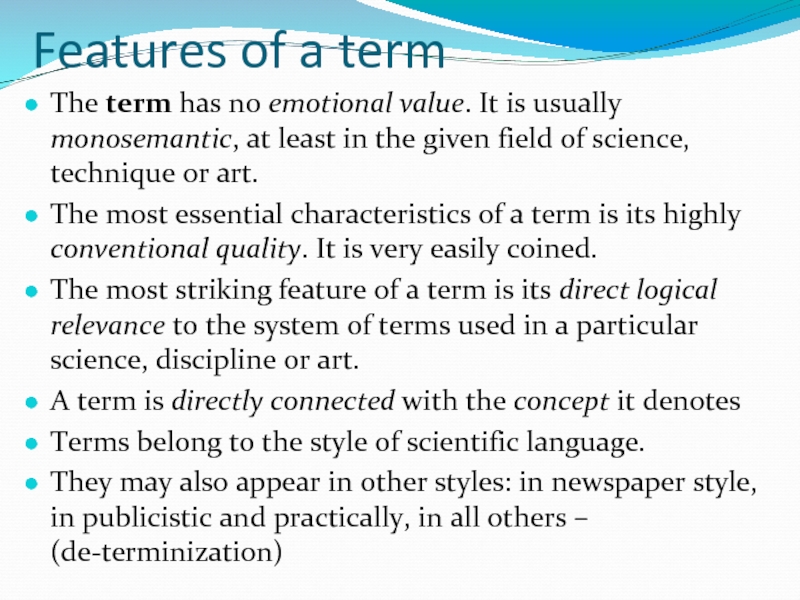
Слайд 20Poetic words
They are mostly archaic words that are rarely used to
produce an elevated effect of speech, their main function being sustaining poetic atmosphere
NOUNS : billow (wave), swain (lover, suitor), yeoman (peasant), main (sea), maid (girl), dolour (grief), nuptials (marriage), vale (valley), steed horse)
ADJECTIVES: lone (lonely), dread (dreadful), lovesome (lovely), beauteous (beautiful), clamant (noisy), direful (terrible), duteous (dutiful).
VERBS: Wax (grow), quath (said), list (listen), throw (believe), tarry (remain), hearken (hear).
PRONOUNS: Thee, thou, thy, aught (anything), naught (nothing)
ADVERBS: scarce (scarcely), haply (perhaps), oft (often), whilom (formerly), of yore (of ancient times), anon (soon)
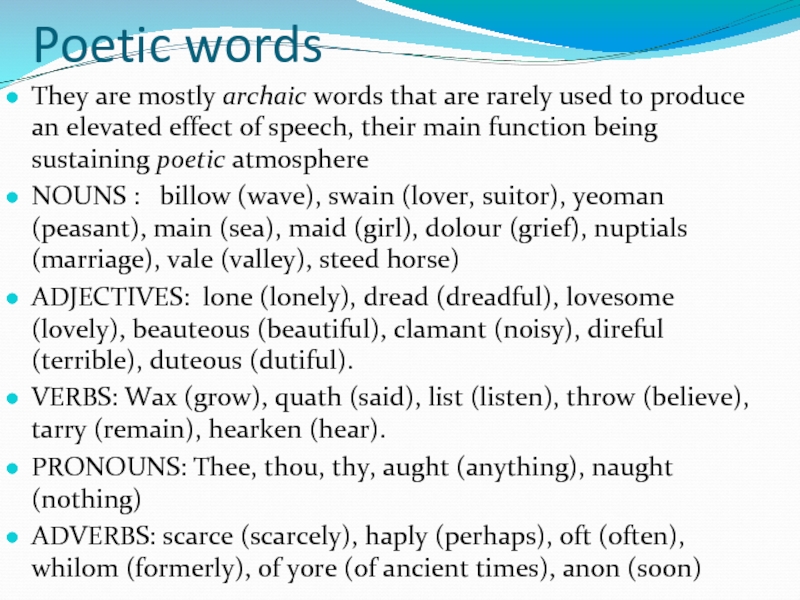
Слайд 21E.A.
Poe
Then this ebony bird beguiling my sad fancy into smiling,
(Beguile – trick smb into doing smth, attract and interest smb)
By the grave and stern decorum of the countenance it wore, (countenance – face or its expression)
`Though thy crest be shorn and shaven, thou,’ I said, art sure no craven. (crest – хохолок,craven – lacking courage)
Ghastly grim and ancient raven wandering from the nightly shore – (ghastly – frightening, unpleasant, involving death or pain)
Tell me what thy lordly name is on the Night’s Plutonian shore!’ Quoth the raven, `Nevermore.’
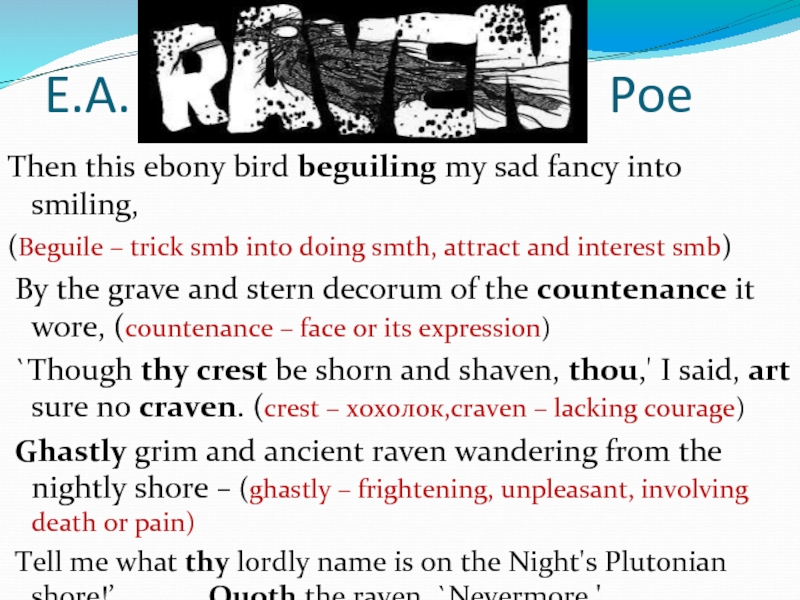
Слайд 22Archaic words
Those that have either entirely gone out of use
or some of whose meaning have grown archaic.
Chaucer’s Canterbury Tales 14th cent.
full would be translated today as very
marriage (marriage) was pronounced zh
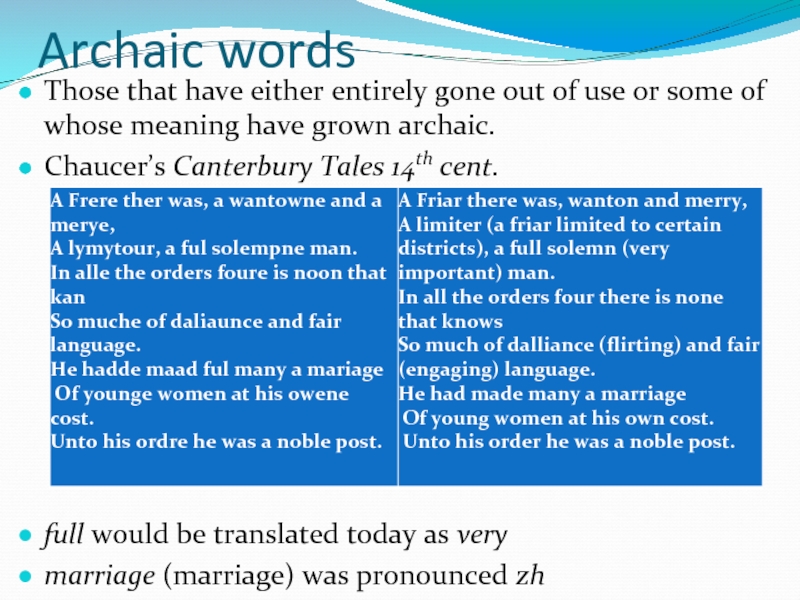
Слайд 23Poetical words in ordinary environment may produce a satirical effect
J.Updyke’s parody
“POETESS”
At verses she was never inept!
Her feet were neatly numbered.
She never cried, she softly wept,
She never slept, she slumbered.
She never ate and rarely dined,
Her tongue found sweetmeats sour.
She never guessed, but oft divined
The secrets of a flower.
A flower! Flagrant, pliant, clean,
More dear to her than crystal.
She knew what earnings dozed between
The stamen and the pistil.
Dawn took her thither to the wood,
At even, home she hithered.
Ah, to the gentle Pan is good
She never died, she withered.
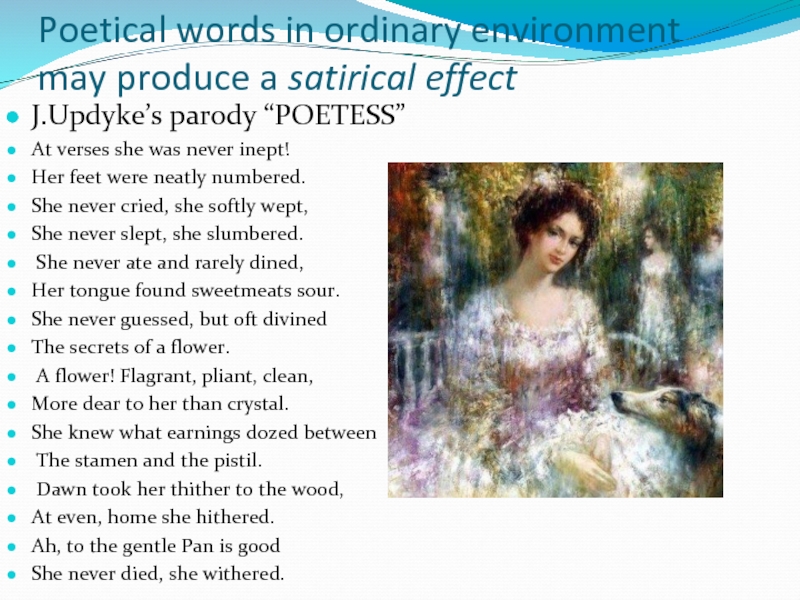
Слайд 24
Archaic, Obsolescent and Obsolete Words
three stages in aging process of words:
when the word becomes rarely used it is called obsolescent – gradually passing out of general use: e.g. morphological forms thou, thee, thy, thine, verbal ending – est, verbal forms – art, wilt.
The second group of archaic words are those that have completely gone out of use but are still recognized by the English-speaking community – we call them obsolete ,e.g. methinks – it seems to me; nay – no etc.
The third group which may be called archaic proper are words which are no longer recognizable in modern English though they were widely in use in Old English. : e.g. throth – faith; bason – tub; descant – melody; hippocras – wine with spices; fortalice – fortress; losel – a lazy fellow
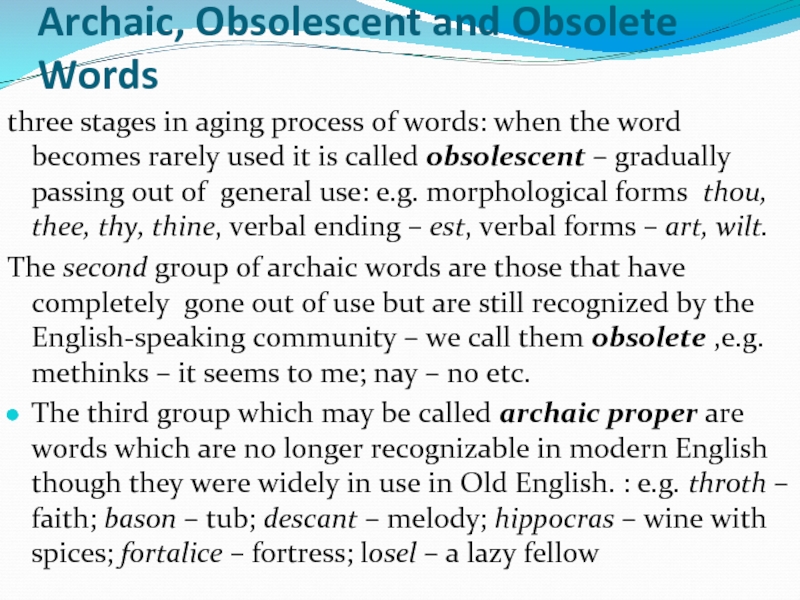
Слайд 25Historic words vs Archaic words
By-gone periods of any society are marked
by historical events, institutions, customs, which are no longer in use: yeoman, goblet, baldric, mace. Such words never disappear from the language – they are historic terms.
Archaic words are mainly used in creation of a realistic background of historical novels to convey what is called “local color”.
Archaisms are frequently to be founding the style of official documents: in business letters, legal language, diplomatic documents – aforesaid, hereby, therewith, hereinafternamed.
Archaic words are sometimes used for satirical purposes and to create an elevated effect
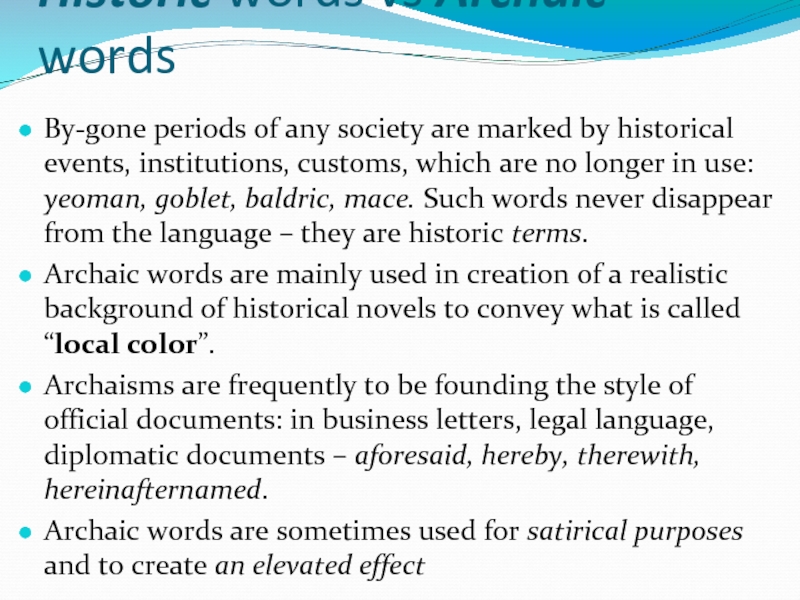
Слайд 26Borrowings
Japan: bonsai, geisha, haiku, hara-kiri, karate, kamikaze, shogun
Native Indians(US): chipmunk, skunk,
totem, wigwam
Polynesia: kava, tattoo, taboo, taro
Australia: boomerang, kangaroo, koala, wombat, dingo
South America: condor, inca, llama, puma, mate, poncho, jaguar, piranha
Greenland: anorak, igloo, kayak, parka
Norway: fjord, lemming, ski, slalom
Arabia: assassin, azimuth, emir, harem, mohair, sherbert, zero, bazaar, caravan
Turkey:coffee, jackal, kiosk, shish kebab
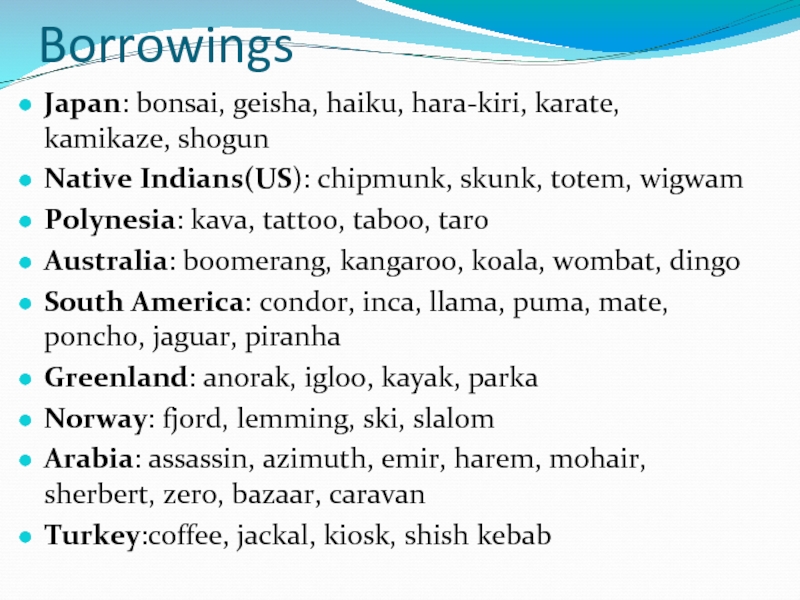
Слайд 27Barbarisms and foreignisms
Barbarisms are words of foreign origin which have NOT
entirely become assimilated into the English language (More specifically, a word considered «improper» because it combines elements from different languages.)
Most of barbarisms have corresponding English synonyms: chic – stylish, bon mot – clever witty saying, ad finitum – to infinity; beau monde – high society.
Some foreign words fulfill terminological function: ukas, udarnik, kolkhoz, solo, tenor, blitzkrig, luftwaffe
Foreignism — a word or expression that has been imported from another language to serve a special semantic function
There tends to be a gradation in English from less to more foreign expressions, from the integrated (but variously pronounced) garage through elite/élite and coup d’etat/état to fin de siècle and pâtisserie.
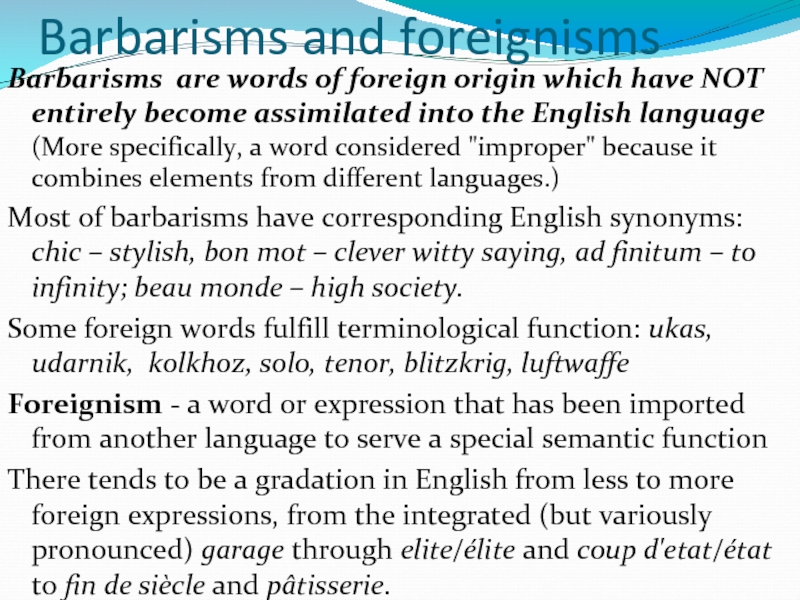
Слайд 28
Literary Coinages and Nonce-Words (Neologisms) WWWebster
neologism is usually defined as “a
new word or a new meaning for an established word”
new words, coined in 19th century by Belinsky, are now absolutely usual and ordinary words: субъект, объект, тип, прогресс, пролетариат
1998 — DVD, heroin chic, middle youth, Viagra, digital television
The first type of newly coined words is connected with the need to designate new concepts resulting from the development of science – terminological coinages
e.g. multislacking — playing at the computer when one should be working, multitasking; ecological footprint — impact or damage to the environment caused by human activity
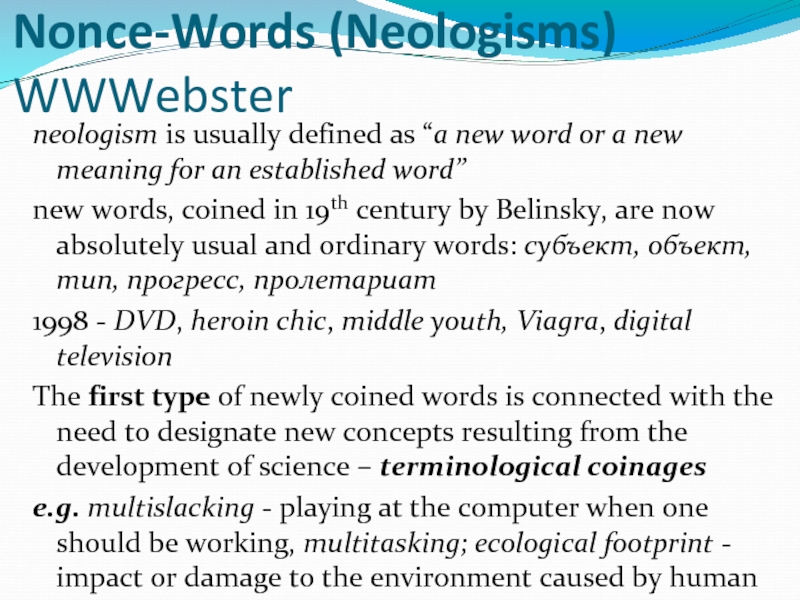
Слайд 29Coinages and nonce-words
Coinage – a newly-created lexeme; nonce-word – 16th century
phrase for the nonce (for the once), a lexeme created for temporary use to solve an immediate problem of communication
Blurb 1907 coined by American humorist Gelett Burgess
E.g.: Loadsmoney, loadspeople; megaplan, megabrand, megacity, user-friendly, environment-friendly, customer-friendly, nature-friendly, girl-friendly; sexism, weightism, heightism, ageism
Back-formation: television-televise; double-glazing – double-glaze; baby-sitter – baby-sit
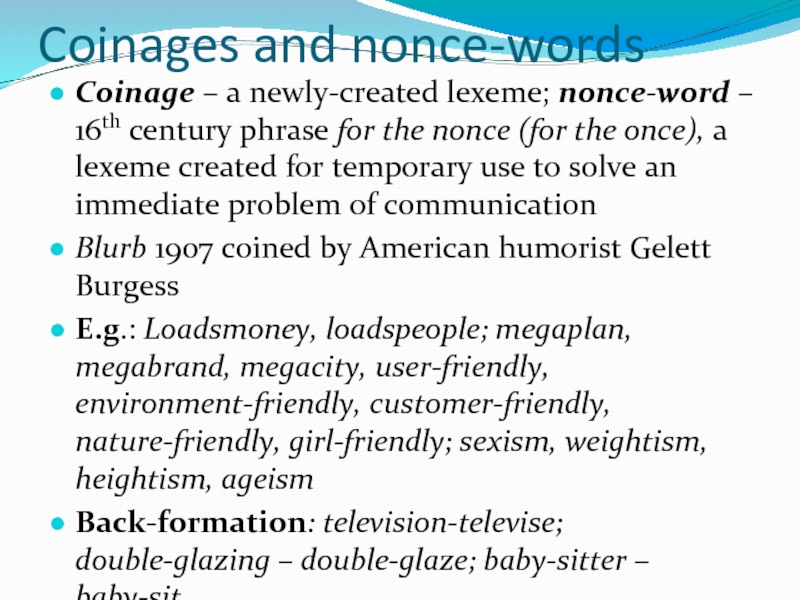
Слайд 30World Wide Words (neologisms)
emoticom ( Emotional Smileys —  ha ha
ha ha
|-) hee hee |-D ho ho :-> hey hey 
The second type arises when the creator of a new word seeks to make the utterance more expressive. Such words are called stylistic coinages.
conversion, derivation (affixation), change of meaning can be considered as the main means of word- building in the process of coining new words.
-ee arrestee, assaultee, auditee, auditionee, awardee, biographee, callee, contactee, contractee, counsellee, dedicatee, electee, extraditee, flirtee, forgee, hittee, interactee, introducee, investee, murderee, outee, ownee, phonee, pickee, rapee, releasee, rescuee, sackee, shortlistee, standees, retiree, refugee, absentee
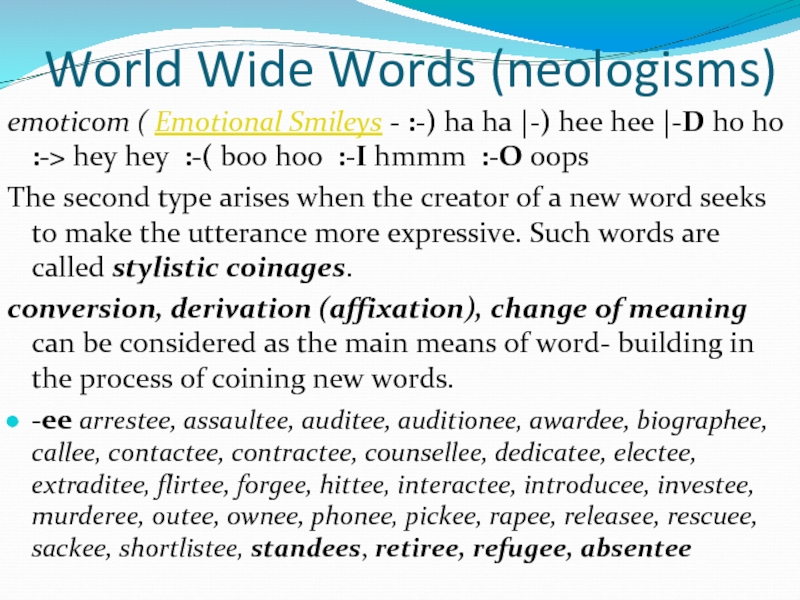
Слайд 32Examples of Internet Jargon
BTW — By the way
CYA — See you
around
FAQ — Frequently asked questions
HTH — Hope this helps
MOTD — Message of the day
YMMV — Your mileage may vary
IIRC — If I remember correctly
IANAL — I am not a lawyer
LOL — Laugh out loud
BFF — Best friends forever
TTYL — Talk to you later
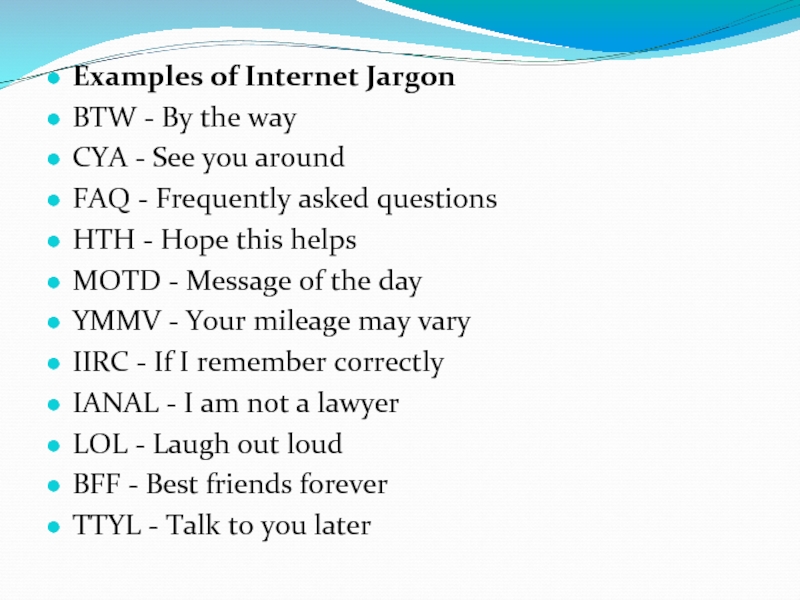
Слайд 33
Special Colloquial Vocabulary:slang
Webster in his “Third International Dictionary» gives
the following definition for the term: slang is “1) a language peculiar to a particular group as a) special and often secret vocabulary used by a class (thieves, beggars) and usually felt to be vulgar or inferior; b) the jargon used by or associated with a particular trade, profession, or field of activity;
2) a non-standard vocabulary composed of words and senses characterized primarily by connotations of extreme informality and usually a currency not limited to a particular region and composed typically of coinages or arbitrarily changed words, clipped or shortened forms, extravagant, forced or facetious figures of speech, or verbal novelties usually experiencing quick popularity and relatively rapid decline into disuse”.
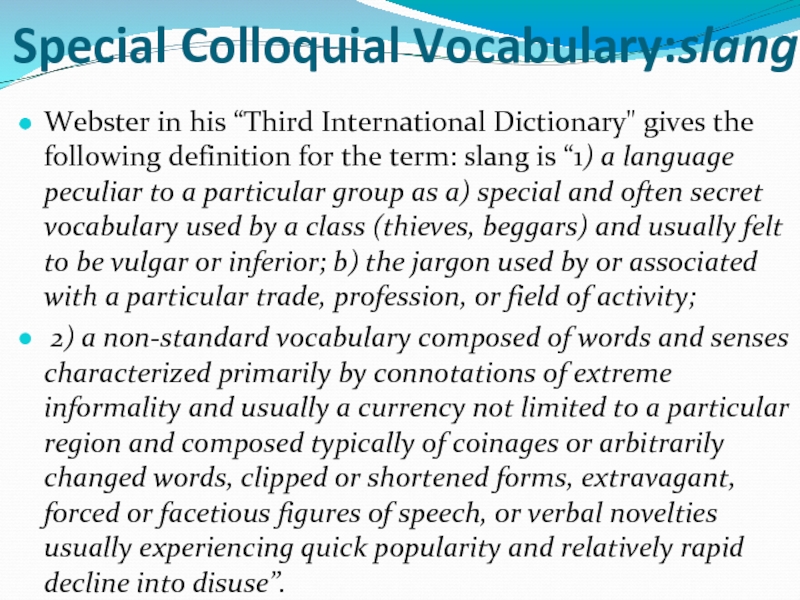
Слайд 34SLANG
The New Oxford English Dictionary defines slang as follows:” a) the
special vocabulary used by any set of persons of a low or disreputable character; language of a low and vulgar type; b) the cant or jargon of a certain class or period; c) language of a highly colloquial type considered below the level of standard educated speech and consisting either of new words or of current words employed in some special sense.”
As is seen from these quotations slang is represented both as a special vocabulary and a special language and as such it should be characterized not only by its peculiar use of words but also by phonetic, morphological and syntactical peculiarities
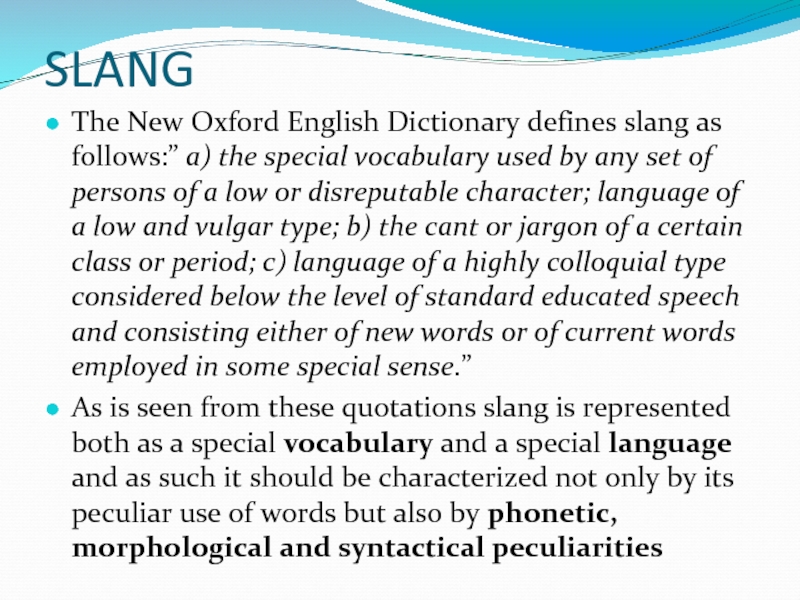
Слайд 35
Jargonisms
Jargon – is a group of words with the aim to
preserve secrecy within one or another social group, a code within a code, social in character : jargon of thieves (cant); of jazz musicians, of the military men; of sportsmen
grease – money; tiger hunter – gambler; loaf – head, man and wife – knife (rhyming slang); manany ( naval jargon)– a sailor who is always putting of a job till tomorrow, from Spanish manana-tomorrow; soap and flannel( naval jargon)– bread and cheese.
Slang, contrary to jargon, needs no translation. It is not a secret code. It is easily understood by native speakers.
Some of jargonisms make their way into the literary language of the nation. They may be said to become dejargonized
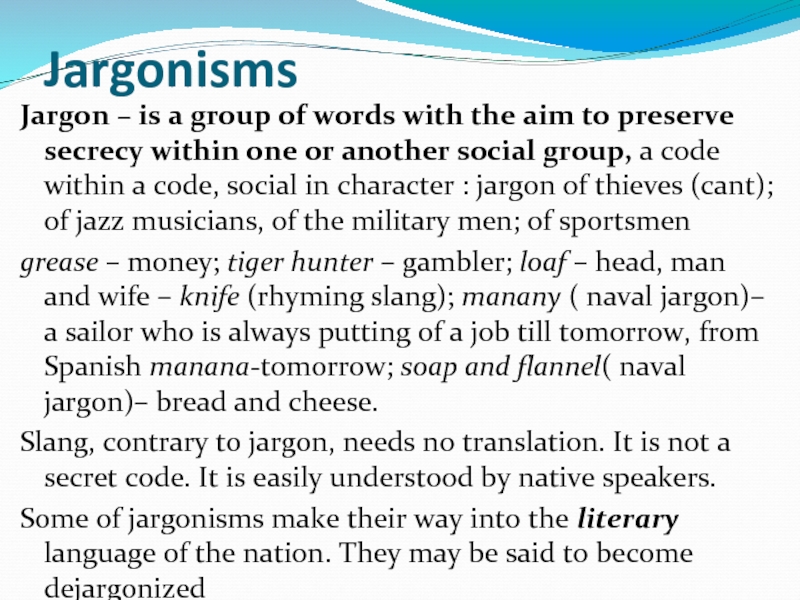
Слайд 36Examples of Medical Jargon
Agonal — a major, negative change in a
patient’s condition
BP — Medical shorthand for blood pressure
FX — bone fracture
JT — A joint
NPO — A patient should not take anything by mouth
IM – Intramuscular
Examples of Political Jargon
Getting on a soapbox — Making a speech in public
POTUS — President of the United States
SCOTUS — Supreme Court of the United States
Example of Police Jargon
Assumed room temperature: An individual has died
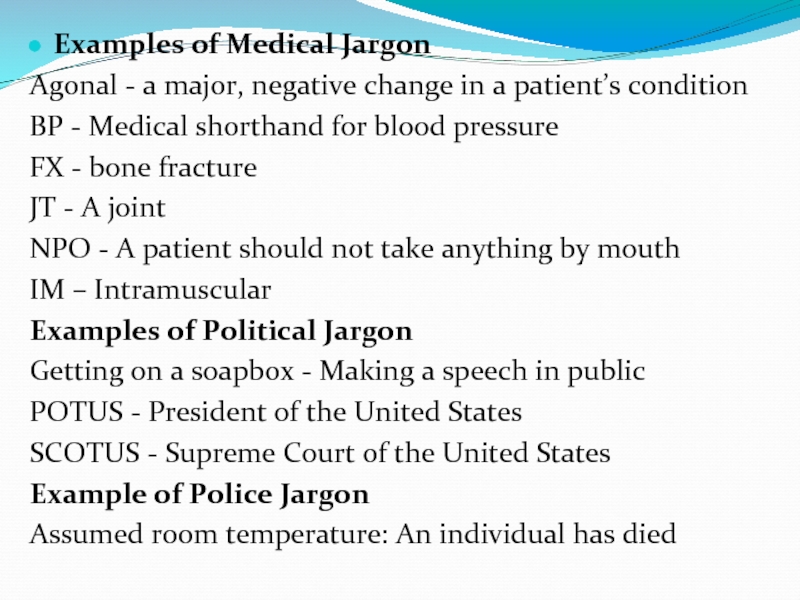
Слайд 37Professionalisms
Professionalisms are words used in a definite trade, profession or calling
by people connected by common interests both at work and at home.
e.g. tin-fish (shipping) – submarine
block buster (military)– a bomb especially designed to destroy blocks of big buildings
piper (cooking) – a specialist who decorates pastry with the use of a cream pipe
a midder case (judiciary)- a midwifery case
outer (boxing) – a knockout blow
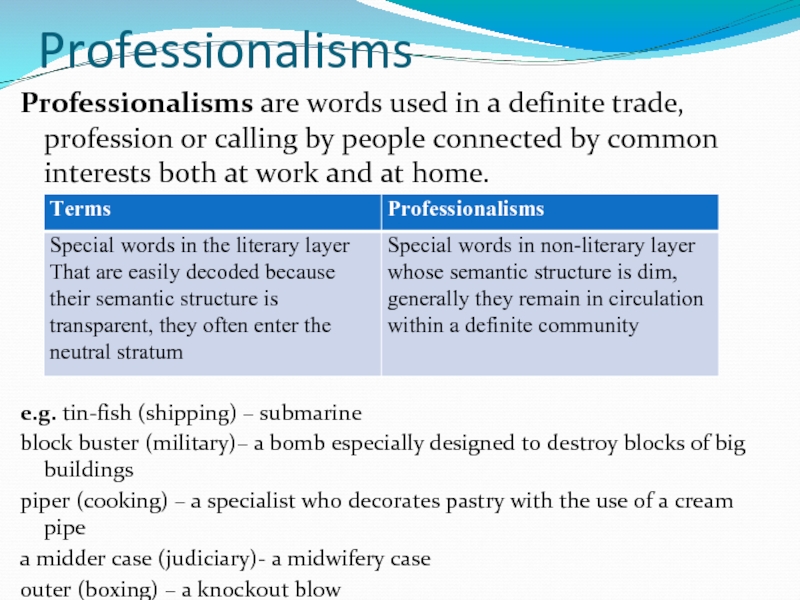
Слайд 38
Dialectal words
Dialectal words – those words which in the process of
integration of the English national language remain beyond its literary boundaries and their usage is generally confined to a definite locality
lass (Scottish)– beloved girl; lad – young man; daft – silly mind; fash – trouble; cutty – naughty girl; tittie – sister; hinny – honey; Australian: brekky – breakfast, mossie – mosquito, Oz – Australia, Pommie – a Britisher, postie – postman
Southern dialect (Somersetshire) has a phonetic peculiarity: initial [s] and [f] are voiced as [z] and [v]: e.g. folk – volk, found – vound, see – zee, sinking – zinking
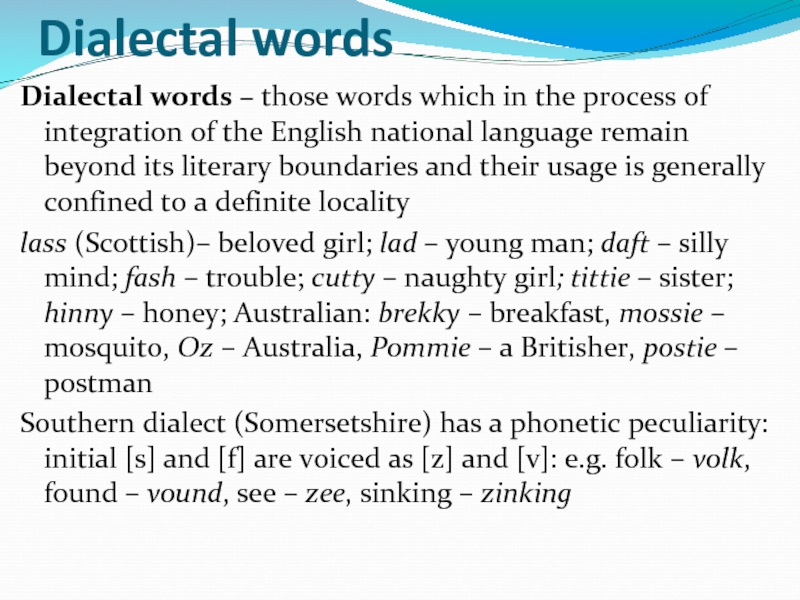
Слайд 39
Vulgar words or vulgarisms
Vulgarisms are: 1) expletives and swear words which
are of an abusive character: damn, bloody, hell, goddam; 2) obscene words (4-letter words the use of which is banned in any form of civilized intercourse)
In Middle Ages and down to the 16th century these words were accepted in oral speech and even in printed one
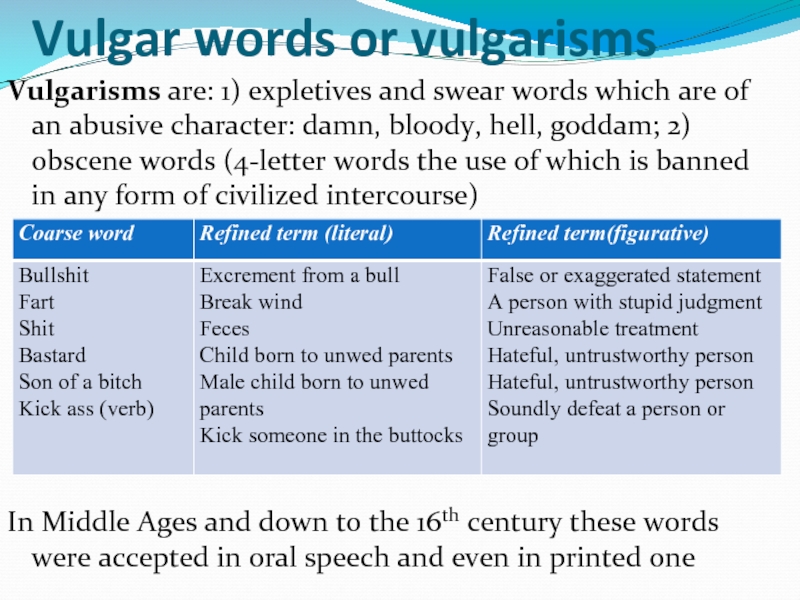

 ha ha
ha ha